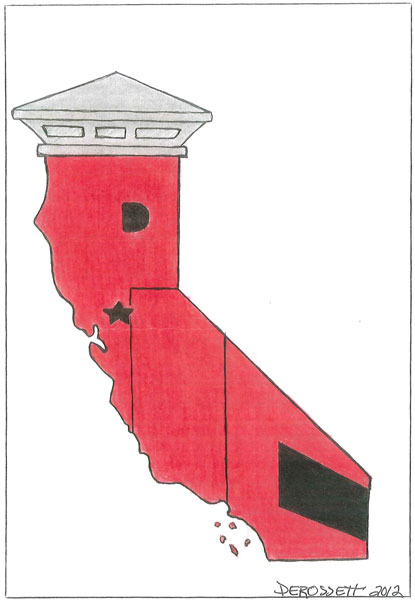Revolution #303, May 12, 2013
(revcom.us)
Voice of the Revolutionary Communist Party, USA
Please note: this page is intended for quick printing of the entire
issue. Some of the links may not work when clicked, and some images may be missing.
Please go to the article's permalink if you require working links and images.
Permalink: http://revcom.us/a/303/600-plus-die-in-bangladesh-garment-factory-collapse-en.html
Revolution #303 May 12, 2013
600+ Die in Bangladesh Garment Factory Collapse
Imperialism, Profits, and Global Factories of Death
May 12, 2013 | Revolution Newspaper | revcom.us
Update May 12, 2013: As more bodies are discovered in the rubble, the death toll in the Bangladesh building collapse is now over 1,100 people.
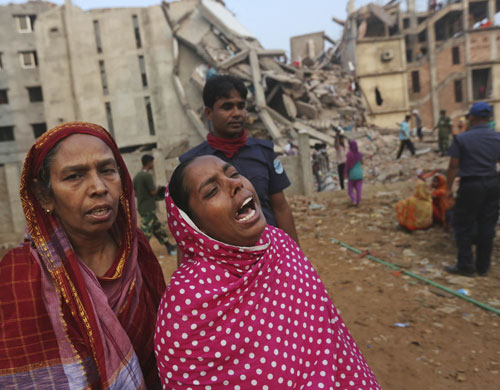
April 26, 2013, Savar, Bangladesh. Relatives of garment workers who worked in the collapsed eight-story building that housed five garment factories. Photo: AP
1
On April 24, 2013, at least 3,500 workers were in the Rana Plaza complex in Savar, Bangladesh, that housed five garment factories. When it collapsed, hundreds died instantly; others lived a few, last horrifying hours or days in a concrete tomb. More than 600 died and hundreds are still missing. Over 2,500 were rescued, many maimed for life, losing their arms and legs.
This was not an accident. This was a crime of a criminal system.
The day before the collapse, workers had reported massive cracks in the walls and refused to go in. But the next day the owners said the building had been inspected and declared safe and ordered the workers back in, threatening them with the loss of a month's pay if they refused. Less than an hour later the top floor buckled, leading to what is ranked as the second most deadly building collapse in modern times after 9/11. The factory owners and managers who ordered the workers in; the engineers who declared the building safe; the political authorities who turned a blind eye to the construction of this death trap—all have blood on their hands.
But if you really want to know why this nightmare happened, and why things like this keep happening, again and again, in Bangladesh, in China, in Mexico, even in the U.S., you have to follow the trail of blood and money from the ruins of the factory, through the sprawling slums in which the workers live, all the way to the gleaming corporate towers of the imperialist world—in New York, in London, in Tokyo, in Paris. Here is where you will find what is at work that leads to and is the cause of such deadly human disasters.
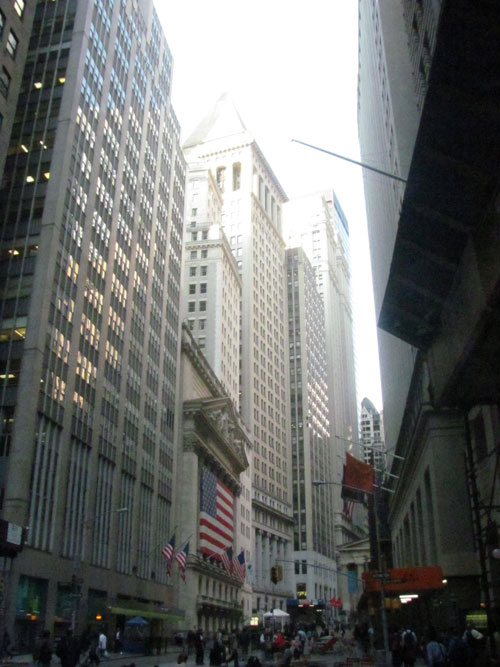
Wall Street, New York City
Photo: Special to Revolution
2
Through slavery, robbery, war, and the grinding exploitation of laboring people, unimaginable wealth has been accumulated by the imperialists. Trillions of dollars are commanded by a small number of huge banks and investment houses in a few wealthy countries. But this accumulated capital is restless. There is intense competition between different blocs of capital and between different imperialist powers, and in this competition even the biggest capitalists can be crushed and ruined, the most powerful empires can crumble. Competing capitalists are driven to go out into the world and find new and more profitable outlets for investment, and to beat out their rivals who aim to do the same. Whether they make clothing or iPhones or luxury cars, whether in England or India or Mexico, is irrelevant to capital—the "product" it is concerned with is profit itself. In pursuit of profit they have enmeshed hundreds of millions in a worldwide net of endless, mind-numbing, back-breaking, and dangerous work. Workers must sell their labor power—their ability to work—in order to survive. And in return for their survival wage (or less), these workers generate even more profit to expand existing capital, to enable it to reach ever wider and ensnare and destroy ever more people.
Especially in the Third World, extremely low wages, child labor, repression of the people, no building or safety codes, and corrupt and pliable local governments are in fact the necessary conditions for profitable imperialist investment, and even a modest improvement in wages and conditions can lead the imperialists to pull up stakes and move somewhere else where people are even more desperate, where conditions are even worse. This is a basic rule of the way capitalism functions and can only function.

Walmart store in the United States. Photo: AP
3
The shelves and racks of brightly patterned clothes, the endless choices for shoppers in cities like New York and Paris, come drenched in the blood of millions of women and children around the world who make the clothes in slave-like conditions.
Clothing is a trillion-dollar-a-year industry, a source of enormous profit, and is built on nightmarish exploitation in the Third World. Bangladesh is a major part of this—3.6 million workers in approximately 4,500 factories generating $20 billion a year in production. Bangladesh has the lowest cost of labor in the world. The national minimum wage is 21 cents an hour, or $38 a month—less than $500 if you work all year. Attempts to organize real unions are brutally suppressed—last year a well-known labor activist was tortured and killed, most likely for trying to organize garment workers.
Bangladeshi capitalists may own these factories and take their cut, but the terms are being set, and the main profits reaped, by imperialist capital, which demands the cheapest possible production under threat of simply shifting their investments to another country. When more than a dozen of the world's largest clothing brands and retailers met in 2011 to discuss working conditions in Bangladesh, Walmart (as well as the Gap) refused to sign on to improving safety conditions. A Walmart representative said: "[I]n most cases very extensive and costly modifications would need to be undertaken... It is not financially feasible for the brands to make such investments."
Even now, garment production is leaving the miserable sweatshops of China for the even worse conditions of Bangladesh.
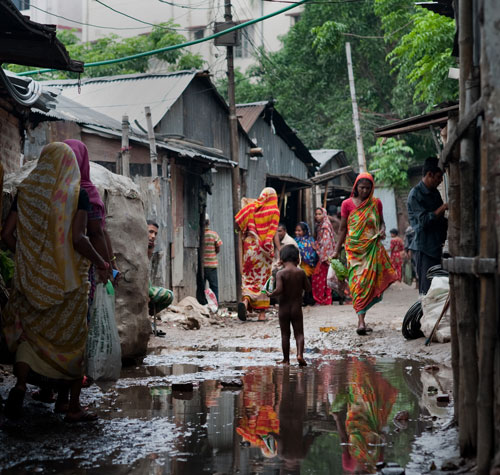
Slum in Dhaka, capital of Bangladesh, 2012. Photo: AP
4
The "appeal" of countries like Bangladesh to imperialist capital is the desperation of huge numbers of people. In many Third World countries, peasant agriculture has been systematically undercut and destroyed by the penetration of imperialist capital—leading to many people flooding the cities in search of work.
In Bangladesh, every three minutes a family from the rural areas moves to the capital city, Dhaka. Conditions in the countryside are increasingly difficult and people come looking for a better life, searching for jobs, a way to feed their children and provide them with clothes. Most of them end up in the growing slums around Dhaka, often in hovels of plastic and cardboard without running water or sewage or electricity. The women come to work in the garment factories, where they know the work will be hard and long, but with hopes and dreams that this will lead to a better life. But once there, the reality is different—working 14 hours a day, seven days a week, with no rights. The victims in Savar were mostly young women 18 to 25 years old, mostly unmarried, newly married, or with one or two children under 5 years old. The dead body of one garment worker was found with a small piece of paper in her hand. She wrote, "Mama and papa, please forgive me. I will not be able to buy medicine for you anymore. Brother, can you look after mama and papa?" (Farida Akhter, CommonDreams.org, April 29, 2013)
Bangladesh's garment industry produces goods worth $20 billion annually; average wages for its 3.5 million workers are about $50/month. These are superprofits, and while some of this goes to the various Bangladeshi operatives, the bulk of it flows into the networks of imperialist capital.
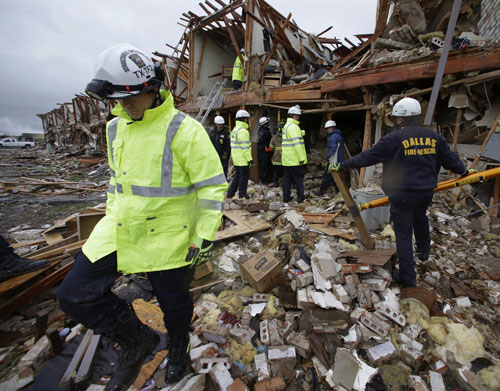
Apartment building destroyed by an explosion at a nearby fertilizer plant in West, Texas, April 18, 2013. Photo: AP
5
In Bangladesh there have been three major industrial incidents in the last five months, including the Tazreen Fashion factory fire in November that killed 112 people.
Such human disasters, such crimes of this system of capitalism, are in fact not unique or even unusual. Cold, calculated disregard for the lives of people, and the inevitable toll in daily suffering and death, have been part of capitalism from its birth hundreds of years ago and continue up to today.
March 1911, New York City, 146 garment workers, mainly young women, die in the Triangle Shirtwaist Factory fire. Employers had locked the exits to prevent unauthorized breaks. September 1986, Kinross South Africa, 177 miners die in a gold mine explosion set off by chemicals banned for use in Europe; between 1900 and 1993, 69,000 South Africans died and over a million were injured in the mines. November 2005, Heilongjiang Province, China, 171 coal miners die in an explosion in the Dongfeng mine; in 2008, 3,000 Chinese coal miners died in mine accidents. December 1984, Bhopal India, a Union Carbide chemical plant in a crowded shantytown leaks deadly gas that poisons 500,000 people, killing 10,000-15,000. September 1991, Hamlet, North Carolina, fire breaks out in a chicken processing plant where workers are locked in—25 killed, 55 injured. April 2010, the Gulf of Mexico, a British Petroleum-run oil rig blows up, killing 11 rig workers and dumping 210 million gallons of oil into the gulf's fragile ecosystem. September 2012, Reynosa, Mexico, explosion at the Pemex oil refinery kills 30 and injures 46. April 2013, West, Texas, a facility storing highly volatile fertilizer blows up, killing 15, injuring 160, and damaging 150 buildings, including an elementary school and an apartment building.
Such horror will continue as long as people are forced to work and live under this system of capitalism-imperialism, which must and can only operate according to the rules of capital chasing after the highest profit. No amount of reforms, good intentions, unions, or supposed "corporate responsibility" is going to change this. There never has been and there never will be a way to organize capitalist production that puts the safety and well-being of human beings ahead of the demand for profit.
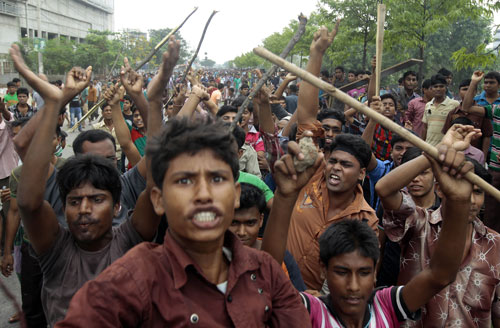
Dhaka, Bangladesh, April 27, 2013. Garment workers block a road during a protest after the collapse of an eight-story building that housed five garment factories. Photo: AP
6
Intense grief, anger, and rage have erupted into days of protest. Factories have been forced to close, workers have gone on strike, demonstrators have smashed and burned cars. The police have attacked people with tear gas and rubber bullets. On May Day, workers marched in the capital of Dhaka demanding safe working conditions and capital punishment for the building's owner. From the back of a truck, a relative said through a loudspeaker: "My brother has died. My sister has died. Their blood will not be valueless."
The hundreds of thousands in Bangladesh protesting this tragedy are sending a message to the rest of the world that this is intolerable. And indeed, this human disaster cries out for revolution, and nothing less, a revolution to get rid of the whole system responsible for the death of the workers in Savar—and the misery of millions of people all over the world.
* * *
For more, see “400 Garment Workers Die in Building Collapse—What Created the Concrete Tombs in Bangladesh?” and “Bangladesh: The Human Cost of Cheap Clothes.”
Permalink: http://revcom.us/a/301/avakian-a-question-sharply-posed-en.html
Revolution #303 May 12, 2013
A QUESTION SHARPLY POSED
by Bob Avakian, Chairman of the Revolutionary Communist Party, USA
April 14, 2013 | Revolution Newspaper | revcom.us
Download Poster (color)(17x22") (PDF)
Download Poster (black & white)(17x22") (PDF)
Download 8.5x11" Flier (PDF): Front | Back
Download QR codes for this article: English | Spanish
NAT TURNER OR THOMAS JEFFERSON?
Slave rebellion or slave master? Do you support the oppressed rising up against the oppressive system and seeking a radically different way, even with certain errors and excesses—or do you support the oppressors, and the leaders and guardians of an outmoded oppressive order, who may talk about "inalienable rights" but bring down wanton brutality and very real terror, on masses of people, to enforce and perpetuate their system of oppression?
This speaks to a basic question of stand and orientation, and represents a fundamental dividing line. And, along with "setting the record straight" on the actual experience and role of communist revolution, and refuting the factual and methodological distortions involved in the attacks on communism, this basic question—as represented by Nat Turner1 or Thomas Jefferson?2—also needs to be sharply posed in relation to the history of communism3 and the present-day struggle for communist revolution, in opposition to the capitalist-imperialist system which still dominates the world, with such terrible consequences for humanity and for the environment. Do you stand with this oppressive system, or with the struggle to overthrow and uproot it, and bring into being a radically different, emancipating system and way of life?
Do we need to learn from not only the overwhelmingly positive experience of the communist movement so far, but also its shortcomings, including sometimes serious errors and even excesses? Yes, this is an important part of the new synthesis of communism, and it is crucial in order to be able to do even better in the new stage of communist revolution. But this can only be done, in the fullest way, by taking up and applying the scientific communist method and approach that leads, first of all, to standing firmly and consistently on the right side of this fundamental dividing line, between oppressors and oppressed—and, beyond that, makes it possible to correctly assess and learn from the rich experience of the struggle against oppression, throughout history and in all parts of the world, including the shortcomings involved in this experience, in order to carry forward the fight to the final goal of communism and the emancipation of the oppressed, and ultimately humanity as a whole, from all forms and relations of oppression and exploitation, domination and degradation, everywhere in the world.

Nat Turner led an uprising that deeply shook the slave system, and there was a huge, brutal response from those in power.
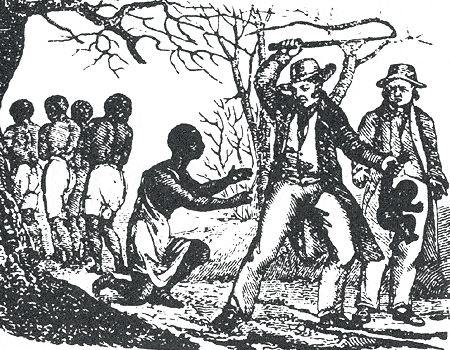
Depiction of plantation life, with overseer beating slaves and taking a child to be sold.
For more on Jefferson and his role:
- The film BA Speaks: REVOLUTION: NOTHING LESS! Bob Avakian Live. (3-disc DVD set, $15, available online at revcom.us; from RCP Publications, PO Box 3486, Merchandise Mart, Chicago, IL 60654, rcppubs@hotmail.com; at a Revolution Books store near you.)
- Communism and Jeffersonian Democracy, by Bob Avakian. (Online version available at revcom.us. Also available in book version at revcom.us)
- Master of the Mountain: Thomas Jefferson and His Slaves, by Henry Wiencek (Farrar, Straus and Giroux, 2012) [back]
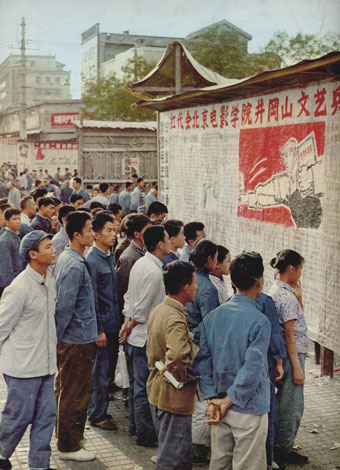
"Big character poster" walls, debating big questions in society, went up all over during China's Cultural Revolution, 1966-1976. Photo: AP
Permalink: http://revcom.us/a/303/on-the-importance-of-a-question-sharply-posed-en.html
Revolution #303 May 12, 2013
Letter From a Reader:
On the Importance of “A Question Sharply Posed: Nat Turner or Thomas Jefferson?” by Bob Avakian
May 12, 2013 | Revolution Newspaper | revcom.us
The more I have studied and thought about “A Question Sharply Posed: Nat Turner or Thomas Jefferson?” by Bob Avakian and discussed this with others, the more sharply this piece and its importance becomes to me. And the more urgently I feel the necessity for the readers of this paper to take this issue of Revolution out boldly and broadly...to find the ways to crack open the debate, especially on the campuses before school ends and among the intellectuals—and to get this out into the neighborhoods and into the schools where those who have been cast out by this society and face the most brutal conditions of life can be found.
As I have wrangled with this piece, I feel that first we must begin at the beginning and understand there is an actual struggle to be waged with many, many people on the very question posed by Bob Avakian at the beginning: “Nat Turner or Thomas Jefferson?” In the new film of BA’s speech Revolution—Nothing Less! and in work after work, and even in the footnotes of the poster, there is the material with which to argue this through with people who are not clear—including those who once knew better and those who don’t even yet know who Nat Turner was—what the real character of slavery was, or that there even were slave revolts or the role that these played.
People are constantly bombarded with the message that communism has been a "failure" and that socialist societies have been a "nightmare." The Set the Record Straight project aims to bring out the truth about the first attempts in human history to build societies free from all exploitation and oppression—the socialist states in Russia from 1917 until the defeat of that revolution in 1956, and in China from 1949 until its defeat in 1976. "The mission of Set the Record Straight is to factually refute the lies spread in the media, mass-market books, and mainstream scholarship about the Soviet and Chinese revolutions, and to bring to light the overwhelming achievements of these revolutions as well as their real problems and shortcomings. Our mission is to reveal the actual history and experience of these revolutions, to open up a two-sided debate about socialism and communism, and to promote a conversation about why a radically different and liberating world is possible." The Set the Record Straight project can be found online at thisiscommunism.org. It can also be accessed from the "Fight the Power, and Transform the People, for Revolution" section of revcom.us and from the Revolutionary Communist Party section at revcom.us/rcp.
So, head on, BA stakes out a position on the controversial historical question “Nat Turner or Thomas Jefferson?” and provides the basic way to argue it out and then the piece goes on to use that benchmark basic question to establish the framework through which to address the even more controversial historical questions and specifically the history of communism and the present-day struggle for communist revolution.
I am writing this in part to urge people to deeply dig into and grapple with the different levels and dimensions to this work, to the different questions that are being raised and how they are being addressed. And, as we do so, I feel we cannot and should not underestimate the importance and urgency of escalating efforts to take this piece OUT into society and the importance of making it a focus of discussion and debate. Let the debate rip over what BA has so sharply and provocatively set forth. And encourage others from all walks of life, including those from the neighborhoods, to broadly distribute and debate this critical, dividing line question that is posed for our revolutionary movement.
I think we could plan to go to conferences, cultural events and street scenes where people who are straining against the horrors in this world today and searching for answers are congregated and find creative ways to put this before the mass of people at these events. Make a big display/installation of the layout of the piece available at revcom.us. Or wear T-shirts and signs which draw people into discussing this work.
Another important avenue for maximizing the societal impact of this work: email and social media. Let’s send this piece out widely, and think about those who would be provoked by this and get it to others. Keep in mind that what is put in the subject line of an email will provoke many to read the email. We can post the PDF’s from revcom.us on different sites and blogs. (Download from the Post This! page from Revolution newspaper at revcom.us) Or make leaflets that have the title of the piece, a graphic and the QR code to link to the work at revcom.us. (Right-click to download the QR code for English, or the QR code for Spanish.)
Also, I have read that Revolution bookstores are holding discussions of this work. Specifically Raymond Lotta will be speaking and leading a discussion at Revolution Books, New York, this week, which will be posted shortly after it happens.
Again, we need to seize the time in many, many ways to get this work out into society and draw that fundamental dividing line which is concentrated in this piece from BA.
Permalink: http://revcom.us/a/303/fertile-ground-for-ba-s-message-en.html
Revolution #303 May 12, 2013
From a reader
Fertile Ground for BA’s Message
May 12, 2013 | Revolution Newspaper | revcom.us
To the editors:
I wanted to share a story a friend of mine told me this morning. He went to the movie The Company You Keep, which grapples with the legacy of the ’60s, on Saturday night. There were about 100 people there. At the end of the movie, as the credits began to roll, he stood at the exit and distributed BA’s new piece “A Question Sharply Posed: Nat Turner or Thomas Jefferson?” He did some very simple agitation as he passed them out, saying that “it’s right to stand with the oppressed against oppression,” but mainly focused on getting out a lot of copies of the statement, reaching 40 or 50 people with the statement.
People were very open to taking this, often commenting positively. With one couple, though, the male came out and very loudly said that two wrongs don’t make a right (even as he took the flyer). My friend replied that a distinction has to be drawn between people standing up against oppression coming from a place of genuinely trying to end that, and people and forces who are trying to enforce oppression. And as the couple passed, his wife turned to my friend and quietly invoked Malcolm X on the need for the oppressed to take determined action against their oppression. It seems that some things that seemed to have been (correctly) settled in the ’60s have been reversed or at least “neutered” in the thinking of many people, and there is work to do—including with this statement—to “un-reverse” that. At the same time, this short but very “packed” statement from BA takes even the positive sentiment of the woman above much further, leading people to grapple not only with the whole history of the struggle for emancipation of humanity from all forms of slavery and oppression—but with the future of that struggle as well!
My point in this is that in any urban area, at any given time, there are many venues featuring cultural works, talks, exhibits, etc. that grapple either with historic or current issues or periods of struggle and/or where things are going today. There are concerns that people have which draw them to such events in the first place and then further open them up to think and engage even more deeply with the very concerns that brought them there. These venues are fertile ground for the message in this statement. So let’s really get this great piece out in a big way to all these kinds of sites as a big part of getting BA Everywhere!
A reader
Permalink: http://revcom.us/a/302/report-from-national-campus-day-of-action-for-abortion-on-demand-en.html
Revolution #303 May 12, 2013
Report from April 25 National Campus Day of Action for Abortion on Demand and Without Apology
April 28, 2013 | Revolution Newspaper | revcom.us
From someone in StopPatriarchy.org:
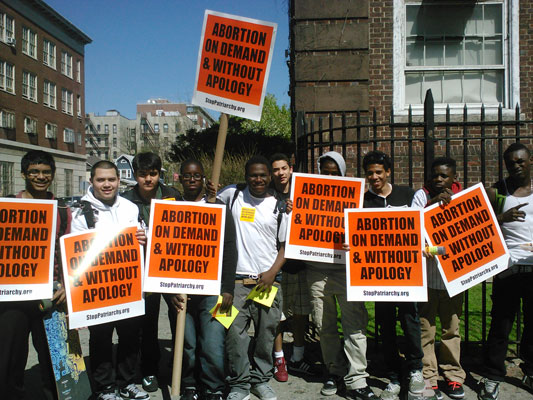
High school students in Brooklyn, NY, April 25, 2013
(See more photos below)
A crew of us from StopPatriachy.org in New York City—including students from Hunter College & Brooklyn College—were out at both Hunter & Brooklyn College on Thursday for the National Campus Day of Action for Abortion on Demand and Without Apology. With our supercool "Abortion on Demand & Without Apology" signs & stickers—we were beautiful! We passed out flyers at a fast clip—and held out stickers, "Make a donation, get a sticker, wear it all day & take a stand for abortion on demand & without apology!" It was great.
A lot of people—both young women & guys, and especially some older women (who remember when abortion was illegal and often have a keener understanding of the stakes) loved this, and enthusiastically plastered a sticker on themselves. "Yes—I'll wear that!" "I am so glad you're doing this." About 60 people signed up, some eager to participate in further struggle for abortion rights this summer.
And of course we got just the opposite: "That's disgusting." Along with a lot of uneasiness and ambivalence. "I think a woman should be able to decide... but really, women shouldn't use abortion as 'birth control.'" "Shoulda thought of that when you spread your legs." "Women should have deal with the consequences of unprotected sex." To such confusion, we would point out that not a single "pro-life" organization isn't also against contraception!
We also found—even on college campuses—a huge amount of ignorance about basic biology. Which is why it was great that we also had a big enlargement of a centerfold from Revolution #166, "A FETUS IS NOT A BABY" (May 31, 2009), which illustrates the biological truth of that. There was lots of conversation and debate and buzz.
Here's what's also very disturbing when you think about it: We actually had a number of people (at both campuses) come upon us and ask, "Are you against abortion... or for abortion?" At first, I was like, "What's not clear about this?" I'm thinking, "How can anyone not get where we stand?" And we realized here's why: Because almost the only time most people encounter anyone making a bold, unapologetic stand about abortion—hell, even saying the word "abortion"—it's the fucking bible-thumping bigots & the so-called "pro-life" movement!
The media, the political "debate," the movies... frankly even on college campuses across this country: Almost nowhere does anyone get to hear the clear, unequivocal truth about abortion: That abortion is one of the most common medical procedures for women in this society (about 1 in 3 women will have an abortion); that fetuses are not babies, abortion is not murder, and women are not incubators. Almost no one gets to engage the actual moral question at the heart of the "abortion debate," i.e., that you are either for women being able to decide, for themselves, when and whether to have a child OR you are for women being forced to bear children against their will. Forced motherhood is female enslavement.
The situation facing women's most fundamental rights to abortion is dangerously imperiled. And people don't even know it. Of course, the antis know it and are on the offensive. Especially a place like NYC, where I live, most people do not know that 97% of rural counties have no abortion provider. They do not know that 2011 and 2012 saw a record number of restrictions on abortion across the country, and already there are 278 bills introduced to further restrict abortion. That several states have only ONE abortion provider, and starting August 1 in North Dakota (for example), abortion will be illegal at around 6 weeks (that's before most women know they are pregnant!).
We also got a report from Revolution Books in Berkeley about a lively speak-out to mark the Day of Action outside UC Berkeley. "Abortion on Demand" stickers flew out of people's hands, eagerly taken up by many, including a medical student who proudly announced she was training to become an abortion provider. Another young woman said she was right in the midst of working on a paper about the enormous hurdles facing poor women in South Dakota who want an abortion. When this scene drew forward a couple of Christian fundamentalists on a soapbox preaching against "sinful students," the Day of Action forces sharply agitated about these Christian bigots' reactionary outlook and program. A crowd of 80+ people gathered around to check out the scene and listen to the back and forth. "This is what Berkeley should look like," someone said. After some initial hesitation, a couple of UC students took the bullhorn to weigh in. "If women can't decide what to do with their bodies it takes away a piece of their humanity," one student said. Another said afterward that she'd had no idea an hour earlier that she'd be speaking to a crowd about abortion rights!
Aside from NYC & Berkeley, people around StopPatriarchy.org were out at DePaul University, Columbia College & Roosevelt University in Chicago, at Cleveland State University, at University of Washington, at Occidental College near L.A. and more.
There needs to be much, much more, on-the-ground, mass resistance to take on these attacks on abortion rights and to change people's thinking about abortion. Our experience in NYC and elsewhere on April 25 definitely brought this to the surface. ABORTION ON DEMAND & WITHOUT APOLOGY needs to become the slogan for the battle around abortion rights, and this summer needs to become a summer of resistance for abortion rights & women's lives.
(Mouseover to enlarge)

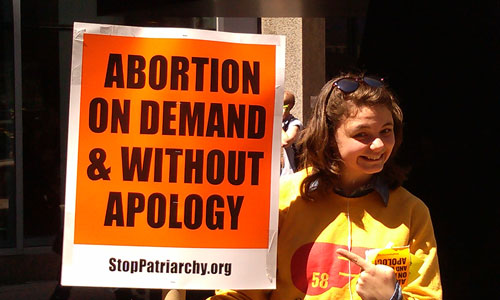
Hunter College, NYC, April 25, 2013

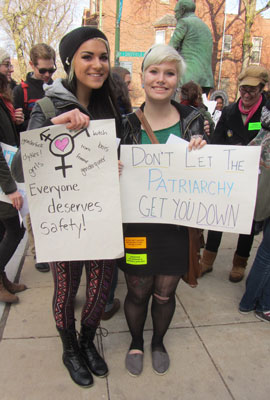
DePaul University, Chicago,
Take Back the Night, April 25, 2013
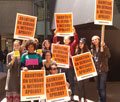
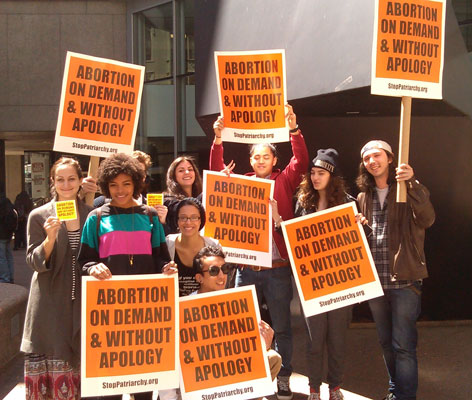
Hunter College, NYC, April 25, 2013

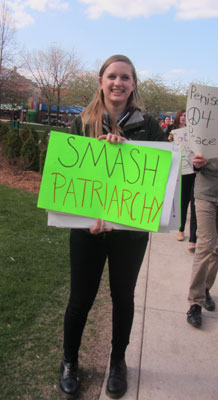
DePaul University, Chicago,
Take Back the Night, April 25, 2013

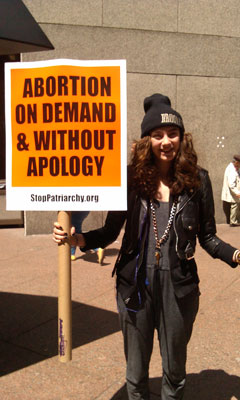
Hunter College, NYC, April 25, 2013

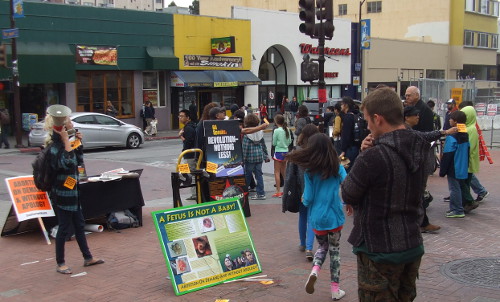
At UC Berkeley, April 25, 2013
Permalink: http://revcom.us/a/303/the-hunger-strike-at-guantanamo-en.html
Revolution #303 May 12, 2013
Guantánamo: The Hunger Strike and the
Hellhole of Made-in-America Torture
May 12, 2013 | Revolution Newspaper | revcom.us
"I've been on a hunger strike since February 10 and have lost well over 30 pounds. I will not eat until they restore my dignity.
"I've been detained at Guantánamo for 11 years and three months. I have never been charged with any crime. I have never received a trial.
"I could have been home years ago—no one seriously thinks I am a threat—but still I am here. Years ago the military said I was a 'guard' for Osama bin Laden, but this was nonsense, like something out of the American movies I used to watch. They don't even seem to believe it anymore. But they don't seem to care how long I sit here, either....
"The only reason I am still here is that President Obama refuses to send any detainees back to Yemen. This makes no sense. I am a human being, not a passport, and I deserve to be treated like one."
Samir Naji al Hasan Moqbel, imprisoned at Guantánamo
without charges of any kind for over 11 years
The hunger strike at the U.S. military base at Guantánamo Bay will soon be entering its fourth month. (For background, see Revolution interview with journalist Andy Worthington—"Hunger Strike at Guantánamo Bay: 'Respect us or kill us'") One hundred and thirty prisoners are now refusing food, according to David Remes, a lawyer who represents 17 of them. Carlos Warner, also a lawyer for the prisoners, recently said prison officials have been force feeding at least 24 of the men. Warner added that it seems the military authorities are rotating people on and off forced feeding.
Forced feeding is a form of torture that involves strapping the prisoner into a chair and shoving a rubber tube into the nose, through the esophagus and into the stomach. The American Medical Association has condemned the use of forced feeding, and its president wrote a letter to the U.S. State Department saying, "The AMA has long endorsed the World Medical Association Declaration of Tokyo, which is unequivocal on the point: Where a prisoner refuses nourishment and is considered by a physician as capable of forming an unimpaired and rational judgment concerning the consequences of such as voluntary refusal of nourishment, he or she shall not be fed artificially."
The spokesman for the United Nations High Commission on Human Rights said of the forced feeding at Guantánamo, "...feeding accompanied with threats, coercion, force or use of physical restraints is a form of inhuman and degrading treatment. Equally unacceptable is the force feeding of some detainees in order to intimidate or coerce other hunger strikers to stop fasting."
But the U.S. government, under its commander-in-chief Barack Obama, continues to torture these men and to imprison them without charges or hope of release.
Cruelty Without End
The prison camp at Guantánamo was opened in 2002 to hold people the U.S. captured in its "global war on terror." Close to 800 people have been imprisoned there; 166 remain today. Over half of these men have been cleared for release by the U.S. but remain incarcerated indefinitely.
Obama claims Congress has tied his hands and prevented him from closing Guantánamo. "They (Congress) would not let us close it," he said at an April 30 press conference. As a legal matter, this is bullshit. The president has the power to transfer prisoners out of Guantánamo. Over 500 prisoners were released during the Bush years. Under Obama, as Reuters news agency reported, "releases have slowed to a trickle" and "no prisoners have left this year."
Obama's cheap excuse is also moral bankruptcy and spineless hypocrisy. But Obama's refusal to move to close Guantánamo for the first 4½ years of his presidency, and to even speak much about it until prisoners there forced his hand as they approached painful death while being tortured by U.S. military personnel, reveals more about the predatory system of U.S. capitalism-imperialism Obama represents than it does about his personal deficiencies.
Establishing Guantánamo as a prison camp was intended not just to imprison captives but to send a message to the entire world that the U.S. could do whatever it wants to whomever it wants. CIA operatives "joked" that the name for Guantánamo's prison should be "Strawberry Fields" because the U.S. could hold prisoners there "forever," as the Beatles song goes.
But 11 years after the prison camp/torture center was founded, the message the world is receiving from Guantánamo is not of the American empire's invincibility, but of its limitless cruelty. The 100 plus men on the verge of death, strapped into chairs with tubes shoved into and yanked out of their bodies, locked in cages in a remote prison camp, have brought to millions a focused picture of the hideous features of American "justice." They have shown that even in the most arduous and unbearable of circumstances it is possible to stand up to the swaggering might of the American military.
Complicity vs. Resistance
When Barack Obama first ran for president in 2007, he promised that once in the White House, he would close Guantánamo and follow the Geneva Conventions for treatment of prisoners. All too many people believed that promise and thought that Obama's ascension to the presidency would put an end to the nightmare Bush years of endless war and legitimized torture. But Obama has continued, and in many ways extended and deepened, Bush's campaign of war, torture, endless detention, and spying.
At the end of April, Obama said, "I am going to go back at this. I'm going to reengage with Congress to try to make the case that this [keeping Guantánamo open] is not something that's in the best interests of the American people."
The truth is that the "best interests" Obama talks about are those of the U.S. empire, a global system of capitalism-imperialism that is the source of countless horrors around the world—from death-trap sweatshops to violence and degradation against women, wars that have killed and displaced millions, mass incarceration of Black and Latino youth in this country, environmental destruction that threatens the very existence of life on the planet, and many others. The interests of this system are NOT the interests of the vast majority of people, including those here in the U.S. And the more that people in this country turn to Obama and "our" government in general for "protection from terrorists," the more that horrible crimes against humanity, such as the torture of the men in Guantánamo, will be perpetrated in our name.
The real interests of the vast majority of people in this country are to oppose the crimes of the U.S. empire—to stop thinking like Americans and start thinking about humanity, and to act on that conviction.
A System Without Legitimacy
The hunger strike at Guantánamo has brought this dungeon and all its horrors to world attention. Obama revealed the real reason for his sudden concern about the situation when he said on April 30 that "Guantánamo is not necessary to keep America safe. It is expensive. It is inefficient. It hurts us in terms of our international standing. It lessens cooperation with our allies on counterterrorism efforts. It is a recruitment tool for extremists. It needs to be closed."
In other words, Obama and the imperialist rulers he represents are concerned that their strategic interests are being damaged by prisoners starving themselves to death to protest their unspeakably inhumane treatment at the hands of the country that proclaims itself the champion of "freedom and democracy and the rule of law." The image of America to millions of people across the planet has become the image of Guantánamo—hooded men in orange jumpsuits, held prisoner behind barbed wire, forced to their knees by heavily armed captors.
One reason Obama essentially ignored the status of Guantánamo for so long is because he has directed U.S. policy to focus on killing, not capturing, those targeted by the U.S. as opponents—especially through the use of drones. John Bellinger, himself a war criminal and an official in the Bush administration who helped draw up the initial U.S. policy on use of drones, recently said, "This government has decided that instead of detaining members of al-Qaida [at Guantánamo], they are going to kill them." And these drone strikes during the years of Obama's presidency have killed thousands of people, many of them civilians, including children.
There's an old saying that was once famously mangled by George W. Bush, and is appropriate for people taken in by Obama's 2007 promise: "Fool me once, shame on you; fool me twice, shame on me." It is shameful—and worse, it is complicity with the crime against humanity that is Guantánamo—to chase the illusion that this time he "really means it," so we should not "rock the boat" by sharply calling out these crimes and waging determined resistance.
A system that jails people indefinitely, without charges, in defiance of its own laws and international law, has lost all legitimacy. A system that routinely tortures people it claims to be its opponents—and justifies this torture in its legal doctrine—has demonstrated beyond any doubt that it is guilty of monstrous crimes against humanity.
The courageous hunger strike at Guantánamo has thrust this hellhole of made-in-America torture and torment to the world's attention. It is crucial, and of utmost urgency, that the fight to close down Guantánamo be intensified, deepened, and broadened in the days ahead.
***
Worldwide Protests Against Guantánamo
Protests demanding the closure of Guantánamo have occurred in several U.S. cities, and across the world. More are planned in the days and weeks ahead, in particular the "International Days of Action" initiated by the London Guantánamo Campaign, for May 17-19, marking 100 days of the Guantánamo hunger strike.
In addition, an Internet petition demanding the closure of Guantánamo gathered over 65,000 signatures in its first day online.
More information about these important activities can be found at worldcantwait.org, andyworthington.co.uk, and londonguantanamocampaign.blogspot.com.
Permalink: http://revcom.us/a/303/the-aftermath-of-the-boston-bombing-en.html
Revolution #303 May 12, 2013
The Aftermath of the Boston Bombing...
And the Far Greater U.S. Crimes in Guatemala
May 12, 2013 | Revolution Newspaper | revcom.us
Update: On Friday, May 10, Efraín Ríos Montt was found guilty of genocide by the Guatemalan Court, and was sentenced to 80 years in prison. According to news reports, indigenous activists and their supporters applauded the verdict but are concerned that Guatemala's current president, Otto Pérez Molina, was himself implicated in the massacres, and that Rios Montt might be released on some pretext. The conviction is the first time a former ruler has been found guilty of genocide by courts in his own country, and is most of all a product of decades of heroic struggle by the survivors of the Guatemalan genocide, and their supporters. It is a step towards justice—but the full role of the U.S. and Ronald Reagan—who consistently endorsed and armed the Ríos Montt regime in carrying out genocide in Guatemala—continues to cry out for exposure and justice.
* * * * *
On April 15, explosive blasts at the finish line of the Boston Marathon killed three people, including an 8-year-old boy. Dozens more were injured, many very seriously. Scenes of bloodshed and terrorized race participants and spectators stunned people on the scene and hundreds of millions who saw it on TV. Whoever turns out to be behind this attack—acts such as this cause great harm and have nothing to do with genuine emancipatory revolution.
But almost instantly, a chorus of politicians, law enforcement officials, and the ruling class media seized on this incident to whip up an atmosphere of rallying around the flag of an empire that carries out the greatest crimes in the world.
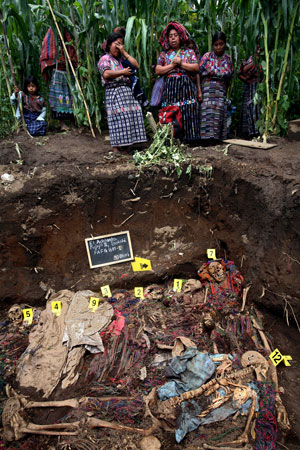
August 2007. Villagers next to mass grave of people massacred by the Guatemalan army in 1982. Photo: AP
Meanwhile, at the very same time that the attack on the Boston Marathon was being given all-out media coverage, a trial of great significance was taking place in Guatemala concerning a U.S.-backed criminal genocide which claimed the lives of 200,000 people in the 1980s. And yet news of this historic trial and of the U.S. role in the crimes that took place were all but impossible to find in the U.S. media. This was the trial of Efrain Ríos Montt, former ruler of Guatemala who presided over horrific massacres of 200,000 indigenous people, and who was praised by Ronald Reagan—one of the most celebrated, promoted, and worshipped dead U.S. presidents—as "a man of great personal integrity and commitment."
In three years, the Guatemalan army destroyed 626 villages, killed or "disappeared" more than 200,000 people—mostly indigenous Mayan people—and displaced an additional 1.5 million people, about a fifth of the entire population. The Guatemalan government had a "scorched earth" policy—destroying and burning buildings and crops, slaughtering livestock, fouling water supplies, and violating sacred places and cultural symbols.
The trial of Ríos Montt opened on March 19 in Guatemala City. Courageous witnesses testified in their native Ixil Mayan language. They described the massacres of people too old to flee. They testified to seeing infants tossed into the flames of burning houses and fetuses being cut out of pregnant women's uteruses. They described people raped in churches. A Guatemalan soldier who had been part of carrying out these crimes testified that his orders were "indio visto, indio muerte." ("An Indian seen is an Indian killed.")
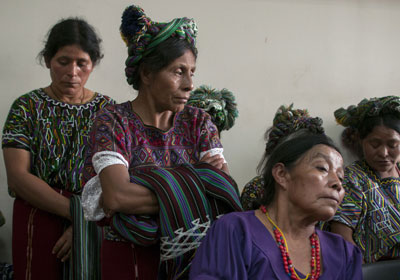
Ixil indigenous women at the trial of Guatemala's former dictator General Efraín Ríos Montt in Guatemala City, April 18, 2013. Photo: AP
One survivor of this horrific genocide said, "When you have lived with what we lived, it never leaves your head." And, he said. "You can never forget."
Painful as it is to reflect on this, think about this happening on a mass scale, for years, literally ripping the hearts out of people and choking the rivers with bodies of the tortured. And ask yourself how can it be that such crimes are buried.
And yet it was buried.
Diverting Pain and Shock into Rallying Around the Flag for Greater Crimes
In the wake of the Boston bombing, Republican senators demanded the surviving suspect be denied a criminal trial and instead be detained as an "enemy combatant." On April 23, former Republican Rep. Joe Walsh from Illinois recommended that the U.S. begin profiling "our enemy ... young Muslim men." And Fox "News" contributor Erik Rush said of Muslims on Twitter, "Yes, they're evil. Let's kill them all."
As this kind of rhetoric spewed forth, Barack Obama seized the moment to proclaim the moral superiority of the USA, to uphold and justify what it does around the world, and to rally people—including people in this country who are repelled by the kinds of fascist responses coming from Republican spokesmen—behind the USA and its flag and agenda around the world. At a church service on April 18, Barack Obama said "in the face of evil, Americans will lift up what's good. In the face of cruelty, we will choose compassion. In the face of those who would visit death upon innocents, we will choose to save and to comfort and to heal. We'll choose friendship. We'll choose love."
And a few days after the Boston attacks, Obama declared a message to "anyone who would do harm to our people. Yes, we will find you. And, yes, you will face justice. We will find you. We will hold you accountable."
From the overtly fascist "kill the Muslims" statements like those by the Fox News contributor, to Obama's rhetoric about the greatness of America , the rulers of this country are seizing on the Boston Marathon attack to rally people behind a U.S. empire that has committed some of the most monstrous crimes in history.
And this is taking place at a moment when the real nature of U.S. imperial rule around the world is bubbling to the surface with emerging exposure and protest against a number of those crimes. There is the trial of the U.S.-backed Ríos Montt in Guatemala. There is growing international and domestic outrage in response to conditions at the U.S. torture chamber at Guantánamo where over 100 prisoners are on a hunger strike. (See page 7.) And there is growing exposure of the effect of U.S. drone attacks which have instituted an ongoing reign of terror and death in a large region of the world—killing hundreds of times more innocent civilians than those killed in the attack on the Boston Marathon.
Behind the Torture and Massacres in Guatemala
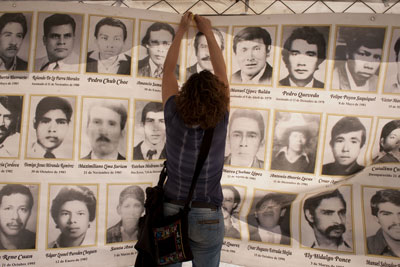
Banner of portraits of some of Guatemala's "disappeared." Photo: AP
While the airwaves in the U.S. were filled with frenetic speculation on who might have been involved in any way in the Boston bombing, and what kind of morality and political thinking was behind the attack... none of these voices in the mainstream media were asking the same questions about Guatemala, where hundreds of thousands of people were massacred.
There is no need to tap phone conversations or dig up secret communications to identify the immoral monster most responsible for the massacre in Guatemala—for which Ríos Montt was on trial. For decades, U.S. imperialism dominated every aspect of Guatemalan life, including the genocidal slaughter in the 1980s.
The massacres in Guatemala took place during the Reagan regime, at a time when the U.S. rulers micromanaged the affairs of this small Central American country. Plantations run by U.S. corporations on land stolen from the Guatemalan people extracted super-profits from enslaved Guatemalan laborers. In 1954, the CIA orchestrated the overthrow of elected nationalist President Jacobo Árbenz Guzmán, who attempted to expropriate and return to peasants a small part of the 42 percent of the arable land of Guatemala that had been stolen from the Guatemalan people by United Fruit—a U.S. capitalist corporation.
Throughout the 1960s, and beyond, U.S.-backed regimes throughout Latin America faced insurgencies born of a long legacy of brutal imperialist exploitation and oppression. When anyone brought up "U.S. democracy," people around the world saw U.S. imperialism marauding around the world from Vietnam to Central America—bringing death and destruction in service of exploitation and oppression. "Yankee Go Home!" was written on the walls from Tijuana, Mexico, to the southern tip of South America and everywhere in between—and around the world as well.
By the 1980s, the Soviet Union—which by this time was a rival imperialist power—worked to use struggles against U.S. imperialism to their own advantage. But to the rulers of the U.S., the fruits of the exploitation of the people of Central America—especially Guatemala, El Salvador, and Nicaragua where insurgencies challenged their domination—were rightfully theirs—they had installed dictatorships and massacred union organizers, dissidents and radicals, overthrown governments and installed puppet dictators for generations to earn that right. Other forces were "outsiders" while, in the context of a global "cold war" with rival imperialists, the rulers of the U.S. considered Central America their "backyard."
Reagan's Visit to the Scene of the Crime
As word began to get out about what was going on in Guatemala, Reagan made a public display of support for Ríos Montt. He traveled to Honduras—which neighbors Guatemala in Central American in December 1982—where he met publicly with Ríos Montt.
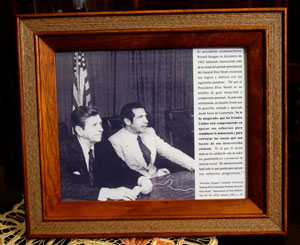
Photo of Ríos Montt with U.S. President Ronald Reagan from 1983, seen in Rios Montt's living room, Guatemala City, 2003. Photo: AP
During the 1982 meeting with Ríos Montt, Reagan declared: "I know that President Ríos Montt is a man of great personal integrity and commitment. His country is confronting a brutal challenge from guerrillas armed and supported by others outside Guatemala. I have assured the President that the United States is committed to support his efforts to restore democracy and to address the root causes of this violent insurgency. I know he wants to improve the quality of life for all Guatemalans and to promote social justice. My administration will do all it can to support his progressive efforts."
After Reagan and Ríos Montt met, a reporter asked Ríos Montt about his "scorched earth" policies; he "quipped" that he had a "policy of scorched communists." And Reagan said Ríos Montt was a man of "great personal integrity" who was "getting a bum rap" from human rights activists.
During the Reagan presidency, the U.S. sent major shipments of military hardware to Ríos Montt, including millions of dollars worth of helicopter parts to ferry troops into remote Mayan villages to carry out ghastly massacres and millions more in additional military supplies.
Think again about what this meant to the people of Guatemala. Allan Nairn recently described on the radio show Democracy Now! how the Guatemalan forces under Ríos Montt carried out their atrocities. "The army swept through the northwest highlands. And according to soldiers who I interviewed at the time, as they were carrying out the sweeps, they would go into villages, surround them, pull people out of their homes, line them up, execute them. A forensic witness testified ... that 80 percent of the remains they've recovered had gunshot wounds to the head. Witnesses have—witnesses and survivors have described Ríos Montt's troops beheading people. One talked about an old woman who was beheaded, and then they kicked her head around the floor. They ripped the hearts out of children as their bodies were still warm, and they piled them on a table for their parents to see."
"Rebranded" U.S. Imperialism and the Celebration of a Monstrous Criminal
At the same time that images of the Boston bombing were filling the airwaves in the U.S., dozens of people who had, as children, survived the massacres orchestrated by Ríos Montt risked their lives to testify against him in Guatemala.
Death threats from people associated with Guatemala's military were sent to judges and lawyers charged with prosecuting Ríos Montt. On April 18, as the trial neared closing arguments, Ríos Montt's lawyers stormed out of the courtroom and declared the proceedings "illegal." Carol Flores, the presiding judge, then ruled that all matters in the case since November 2011 were null and void, and that the legal proceedings against Ríos Montt were suspended. At this writing, it appears the trial is resuming, but it is unclear how the proceedings against Ríos Montt will proceed at this point.
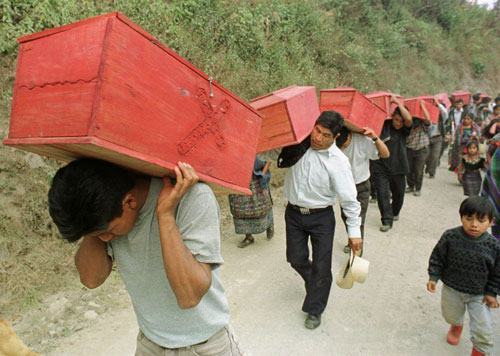
Guatemala, January 1999. Mayan men carry the coffins of victims killed by Guatemalan government in 1982, to a reburial ceremony in Xecoxol, north of Guatemala City. Photo: AP
Today, the rulers of the U.S. have moved to "rebrand" their role in the world, including in Latin America. CIA coups, puppet fascist dictators, and death squads—we are told—have been replaced with micro-loans and support for "democratic institutions." The hungry, oppressed people crowding the slums and dying in the countryside of Asia, Africa, and Latin America are—we are told—in need of the blessings of U.S. democracy. And anyone who sympathizes with, or feels solidarity with, the people of the world is told to channel their energy into institutions that fit into or cover up the nature of bringing that "democracy" to the world. In fact the rulers of the U.S. and their apologists claim the trial of Ríos Montt is the result of their work to create an independent functioning judiciary in Guatemala.
But ask those who rule the U.S. and their mouthpieces, those who portray themselves as bringing enlightenment, "democracy," and progress to the world why they are covering up their role in the genocide in Guatemala. And why they continue to iconize Ronald Reagan, the U.S. president who presided over the worst of these horrors.
A Need for, and the Existence of, a REAL Alternative
The poverty, misery and death one finds throughout the world are—overwhelmingly—the product of what the U.S. spreads around the world. Sometimes, in the face of the struggles of the people, the rulers of the U.S. will make minor adjustments to how exploitation and oppression are enforced. Sometimes, as was the case in Egypt, the U.S. suddenly "discovers" that bloody tyrants it put in power and worked through for decades are tyrants after all.
But through all these maneuvers, the interests of the U.S. empire continue to be exploitation and oppression, and they are enforced most fundamentally through invasions and drones, media lies and propaganda, death squads, and torture chambers. All this, they say, is bringing "democracy" to the world.
Bob Avakian has brought forward a real, genuinely libertatory alternative to capitalism—a new synthesis of communism. And as part of doing that, he has sharply exposed the real nature what it is the U.S. brings to the world:
The essence of what exists in the U.S. is not democracy but capitalism-imperialism and political structures to enforce that capitalism-imperialism. What the U.S. spreads around the world is not democracy, but imperialism and political structures to enforce that imperialism.
BAsics 1:3
People around the world—from Egypt and Syria to the inner cities of the U.S., from the smoldering ruins of an exploded fertilizer storage facility in West, Texas, to the sweatshops of Bangladesh—anyone looking for a path to liberation: look beneath the surface at the real nature of what it means to bring "U.S.-style democracy" to the world.
Take a look at the crushed and brutalized bodies of the victims of what the U.S. spreads around the globe. Take a look at the immoral monsters these murders invoke as heroes and role models. And get into, and get with the only real alternative to capitalism on the planet: the new synthesis of communist revolution.
* * * * *
Correction: An earlier version of this article stated that witnesses "testified to seeing infants tossed into the flames of burning houses and unborn children being cut out of pregnant women's uteruses." As part of the barbaric brutality of the U.S.-sponsored massacres, fetuses were cut out of pregnant women's uteruses. There is, scientifically, no such thing as "unborn children."
Permalink: http://revcom.us/a/303/a-dialogue-between-cornel-west-and-carl-dix-en.html
Revolution #303 May 12, 2013
Mass Incarceration + Silence = Genocide:
Act to STOP It Now!
A Dialogue between Cornel West & Carl Dix
May 12, 2013 | Revolution Newspaper | revcom.us
Monday • May 20 • 7:30 PM
The Church of St. Paul & St. Andrew
263 W. 86th Street
(between Broadway and West End Ave.)
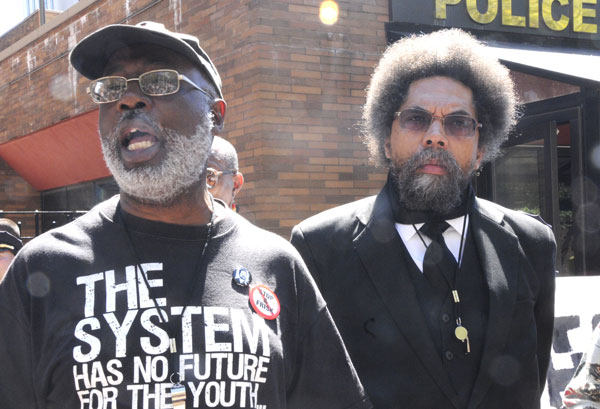
This fundraising evening for Revolution Books and the Stop Mass Incarceration Network promises to be a dynamic and substantive conversation between two people on the cutting edge of calling out all the horrors this system inflicts on people all over the world and actively involved in calling on people to stand up and build resistance to them.
For more information on this dialogue, to get involved in spreading the word on it, selling tickets and working to make it happen, contact Revolution Books (212-691-3345) or the Stop Mass Incarceration Network at (347) 979-SMIN (7646) or stopmassincarceration@gmail.com.
General admission: $20
Youth/unemployed: $10
Premium tickets: $100 (benefits Revolution Books,
includes special seating)
Revolution Books / Libros Revolución
146 W. 26th Street, New York, New York 10001
www.revolutionbooksnyc.org 212-691-3345 revbooksnyc@yahoo.com
Permalink: http://revcom.us/a/303/emergency-call-join-us-in-stopping-torture-in-u-s-prisons-en.html
Revolution #303 May 12, 2013
Emergency Call! Join Us in Stopping Torture in U.S. Prisons!
May 12, 2013 | Revolution Newspaper | revcom.us
Tens of thousands of people imprisoned in the U.S. are being subjected to torturous, inhumane conditions. Many are:
- Held in long term solitary confinement; locked in tiny, windowless, sometimes sound proof, cells; cut off from fresh air and sunlight for 22-24 hours every day and given small portions of food that lacks basic nutritional requirements.
- Denied human contact and violently taken from their cells for petty violations.
- Put in solitary arbitrarily, often because of accusations of being members of prison gangs based on dubious evidence, and have no way to challenge the decisions of prison authorities to place them in solitary.
Many are forced to endure these conditions for months, years and even decades! Mental anguish and trauma often result from being confined under these conditions. Locking people down like this amounts to trying to strip them of their humanity.
These conditions fit the international definition of torture! This is unjust, illegitimate and profoundly immoral. WE MUST JOIN IN AN EFFORT TO STOP IT, NOW!
People imprisoned at Pelican Bay State Prison in California have called for a Nationwide Hunger Strike to begin on July 8, 2013. They have also issued a call for unity among people from different racial groups, inside and outside the prisons. People who are locked down in segregation units of this society's prisons, condemned as the "worst of the worst," are standing up against injustice, asserting their humanity in the process. We must have the humanity to hear their call, and answer it with powerful support!
I just finished reading the statement sent by CDCR [California Department of Corrections and Rehabilitation] SHU prisoners ("Peaceful Protest to Resume July 8, 2013, if Demands Are Not Met") and I wanted to express the following. First, I would like to say that I'm glad that SHU prisoners haven't given up on the struggle. For, there are many people, to quote Frederick Douglass, "who profess to favor freedom and yet depreciate agitation. They want crops without plowing up the ground. They want rain without thunder and lightning."
Read more
A nationwide and worldwide struggle needs to be launched NOW to bring an end to this widespread torture before those in the prisons are forced to take the desperate step of going on hunger strikes and putting their lives on the line!
To the Government: We Demand an Immediate End to the Torture and Inhumanity of Prison House America—Immediately Disband All Torture Chambers. Meet the demands of those you have locked down in your prisons!
To People in this Country and Around the World: We Cannot Accept, and We Should Not Tolerate This Torture. Join the Struggle to End Torture in Prisons Now!
To Those Standing Up in Resistance Inside the Prisons: WE SUPPORT YOUR CALL FOR UNITY IN THIS FIGHT, AND WE WILL HAVE YOUR BACKS!
June 21, 22 and 23 Will Be Days of Solidarity With the Struggle to End Prison Torture! There will be protests, cultural events, Evenings of Conscience, sermons in religious services, saturation of social media—all aimed at laying bare the ugly reality of wide spread torture in U.S. prisons and challenging everyone to join in fighting to STOP it.
Bah Abdourahmane; Ron Ahnen, California Prison Focus; Gbenga Akinnagbe, actor and director; All Of Us Or None members: Sundiata (Willie) Tate, Manuel La Fontaine, Sheila Blake, Dorsey Nunn, Marilyn Austin-Smith, Elder R. Freeman, Oakland; Rafael Angulo, Clinical Associate Professor, USC School of Social Work; Yejide Ankobia, Red Clay Yoga; Larry Aubry, Advocates for Black Strategic Alternatives; Mike Avila; Nellie Hester Bailey, Occupy Harlem; Tim Baldauf-Lenschen, student activist, University of Maryland; Mike Baldwin, SF Bay Area activist; Fanya Baruti, Formerly Incarcerated and Convicted People's Movement; Elizabeth Bell; Joe Berry, Coalition of Contingent Academia Labor/ New Faculty Majority*; Brooke Bischoff, Prescott College*; Rev. Dr. Dorsey O. Blake, Presiding Minister, The Church for the Fellowship of All Peoples, S.F. CA; Uncle Bobby, Oscar Grant Foundation/Committee; Brian Bonne; Blase Bonpane, Ph.D., Director OFFICE OF THE AMERICAS; Kwan Booth, Journalist, Oakland CA; Felice Brown, Glen Burnie MD; Ashley Burks, NYU student; Attorney, John Burris, Oakland CA; Rev. Richard Meri Ka Ra Byrd, KRST Unity Center Of Afrakan Spiritual Science, LA; CAL Football* Players - Alejandro Crosthwaite, Khairi Fort, and Richard Rodgers, Berkeley; Susan Castagnetto, lecturer, Scripps College*, So. Cal; M.J. Christian, Los Angeles; Lauren Clifford, Green Party of California; Marjorie Cohn, Professor, Thomas Jefferson School of Law and editor, "The United States and Torture: Interrogation, Incarceration, and Abuse"; Solomon Comissiong, Executive Director, Your World News; Andres Thomas Conteris, Nonviolence International*; Antonio Corona, Brown Beret National Organization; Lloyd Cox, Oakland; Matt Courter; Marion Crawford, advocate against Injustice, Louisville KY: Randy Credico, impressionist and social comedian; Alejandro Crosthwaite, Cal Football* player; Chuck D, Public Enemy*; Petr Dann, Sun Prairie, Wisconsin; Earle Davis, Artist/Musician, Berkeley, California; Colin Dayan, Vanderbilt University*; Stephanie Demos; Noche Diaz, Revolution Club NYC, and Stop Mass Incarceration Network; Melvin Dickson, former Black Panther Party member; Roger Dittmann; Carl Dix, Revolutionary Communist Party; Dianne Durham, Publicist – Out of Bounds*, Oakland; Sand Fessler, RAW {Rochester Against War}, & Upstate Coalition to Ground the Drones and End the Wars; Ever Ivan Florez, A Victim of CDC; Glen Ford, Black Agenda Report; Khairi Fort, Cal Football*; Joel "Phresh" Freeman, Graffiti Artist, Oakland; Pamela Fruge; Bob Gorringe, Codepink*; Chris Gwartney, Monterey CA; Margaret Haule, Community Activist; Robyn Hewitt, Las Vegas NV; Nicholas Heyward Sr., father of Nicholas Heyward Jr., who was murdered by the NYPD in 1994; Hip, UC Berkeley*; Mike Holman, Prisoners Revolutionary Literature Fund*; Foluke Jose, Cal State University, Northridge*; Steven Joy, UCLA*; Noel Juan, Music Director, San Francisco; Beth Kasner; Robin D. G. Kelley, Professor of American History, UCLA; Kevin Keresey, Filmmaker; Gregory Koger, a revolutionary communist who was imprisoned as a youth and spent many years in solitary confinement; Wayne Kramer, Jail Guitar Doors USA; David Kunzle, Distinguished Professor, UCLA Emeritus; James Lafferty, Executive Director, National Lawyers Guild / Los Angeles; Jonathan Laks, Santa Monica, CA; Michael Lange, Actor, Oakland; Verbena Lea, Redwood Curtain CopWatch, Peoples' Action for Rights and Community; Legal Services for Prisoners with Children, San Francisco (organizational endorsement); Clarence Leonard; Stanley Lewis; Katie Lindsey; Angelina Llongueras, member of the San Francisco Revolutionary Poet Brigade; Cadelba Lome Li' Loibl, Registered Nurse; B.M. Marcus, Community Director, Community Advocate and Development Organization, Brooklyn; Martha, Berkeley, California; Dr. Antonio Martinez, Institute for Survivors of Human Rights Abuses* and co-founder of the Marjorie Kovler Center for the Treatment of Survivors of Torture*; Chris Martinez, Los Angeles; Cynthia McKinney, former Congresswoman & 2008 Presidential Candidate for the Green Party; Erma McKinney; James McKinney, Instructor, City College of San Francisco; Marilyn McMahon, California Prison Focus*; Christa Meyer, Monterey; David Meyerhof; Natasha Mohammed, Travis Morales, Stop Mass Incarceration Network; Samsarah Morgan; Jacob Muehlbauer, Austin, TX; Khalil Gibran Muhammad, Director, Schomburg Center for Research in Black Culture*, and author, The Condemnation of Blackness: Race, Crime, and the Making of Modern Urban America; Luke Nephew, New York; Efia Nwangaza, Malcolm X Center for Self Determination, Greenville, SC; T.S. O'Sullivan, Albuquerque, New Mexico; Katherine O'Toole, Oakland; Kathleen D. Olsson, KPFA Radio*, Oakland; Oscar Grant Foundation (organizational endorsement); Joseph V.A. "Joe" Partansky, MBA, Former U.S. Army Mental Health Specialist and current advocate for persons with mental disabilities; Aidge Patterson, artist and activist, New York; Brian Pike, Universal Life Church Rabbi; Veronica G. Powers M.D.; Prison Watch Network (organizational endorsement); Mary Prophet, Educator, Oakland; Laura Pulido, Professor, American Studies & Ethnicity, USC*; Belinda Ramos, son serving life in a California State Prison; Mary Ratcliff, SF Bay View; Larry Redmond, Chicago; Rev. George F. Regas, Interfaith Communities United for Justice and Peace (ICUJP)*; Aleister Ren, revolutionary, poet, and musician; Roman Rimer; Richard Rodgers, Cal Football*; Steven Rood, Attorney, Oakland; Temitope S, So Cal; Karen Saari, Bodega, CA; Elizabeth Sanchez, East Bay Community Law Center*, Berkeley, California; San Francisco Bay View, national Black newspaper (organizational endorsement); Peter Schey, President, Center for Human Rights and Constitutional Law*; Roger Scott, Member, AFT Local 2121; J. Tony Serra, Lawyer, SF; Mansoor Shah; Zadik Shapiro, Attorney; Cindy Sheehan; Sheila, New York; Dyne Suh, Los Angeles; Dan Siegel, National Lawyers Guild*; Peter Smith; Social Justice Committee (of the Berkeley Fellowship of Unitarian Universalists*); Tora Spigner, RN, Alta Bates Summit Medical Center*, Planned Parenthood-Shasta/Diablo*, Mother's Love Doula Services*; Lavelle Spitz, Independent hip hop artist/humanitarian in training; Michael Stocks, Film technician; Dyne Suh, Los Angeles; Debra Sweet, Director, World Can't Wait; Nick Szuberla, Nation Inside*; Martha Teklu; Temitope S, So. Cal; Prof. Edgar L Torres, Latino Educational Association*, City College of San Francisco*; Evelin Avila Torres, UCSC*; John Turok, Occupy Oakland*; Michael Treece, San Francisco; Scott Trent, Guilford County, NC October 22nd Coalition; Troy Troyer; Luis Valdez, Founding Artistic Director, El Teatro Campesino, CA; Jeremy Varon, longtime anti-GTMO activist; Louis Vitale, O.F.M.; Patty Villasenor; Jim Vrettos, Professor, John Jay College of Criminal Justice*; Will Walke, Oakland; Arianna Wassmann, Stanford University student; Corey Weinstein, M.D., San Francisco Correctional Medical Consultant; Arinna Weisman, Buddhist Insight Meditation teacher and minister; Liza Wendt, retired teacher; Cornel West, author, educator, voice of conscience; Robin Woerner, New Haven; Clyde Young, revolutionary communist and former prisoner.
*For identifications only
For more information and to join in this struggle contact the Stop Mass Incarceration Network at (347) 979-SMIN (7646) or at stopmassincarceration@gmail.com.
Permalink: http://revcom.us/a/303/high-school-graduation-with-a-real-future-en.html
Revolution #303 May 12, 2013
High School Graduation—With a Real Future
May 12, 2013 | Revolution Newspaper | revcom.us
With the graduation season coming up, we want to draw readers' attention to a great report we received last year about a graduation ceremony at an LA high school where a fifth of the graduates wore buttons with this quote from Bob Avakian:
No more generations of our youth, here and all around the world, whose life is over, whose fate has been sealed, who have been condemned to an early death or a life of misery and brutality, whom the system has destined for oppression and oblivion even before they are born. I say no more of that.
BAsics 1:13
Find this report online at:
revcom.us/a/273/high_school-graduation_with_a_real_future-en.html
Permalink: http://revcom.us/a/303/awtwns-bangladesh-the-human-cost-of-cheap-clothes-en.html
Revolution #303 May 12, 2013
From A World to Win News Service:
Bangladesh: The Human Cost of Cheap Clothes
May 12, 2013 | Revolution Newspaper | revcom.us
Update May 12, 2013: As more bodies are discovered in the rubble, the death toll in the Bangladesh building collapse is now over 1,100 people.
April 29, 2013. A World to Win News Service. Bangladeshi garment workers have suffered yet another tragedy and outrage, this time in the industrial suburb of Savar, 30 kilometers outside of Dhaka. Those who first arrived on the scene could see mangled body parts amid the mangled metal and concrete and hear calls for help from those trapped in the ruins. As of April 29, the bodies of more than 380 people have been found in the ruins of Rana Plaza. Most were crushed to death by the collapse of the building where they worked. Several hundred people are still missing. Over 1,200 have been injured, many with loss of limbs. Four days after the collapse a fire broke out on one of the floors, putting an end to the barely audible voices still crying out to be saved. Rescue workers wept after coming so close but ultimately failing to save a trapped woman they had been talking to. After days of working through the rubble with bare hands and small tools, and with the passage of time dimming hope, the heavy construction machinery brought in contributed to sharply reducing hopes for finding more survivors.
Officials noted a crack in the walls of the eight-story building on April 23, and people were evacuated. The shops and a bank on the ground floor stayed closed on the next day. But factory owners threatened their employees to go back to work or face being docked a day's pay or worse. At 9 am, one hour into the day's start, a huge noise was heard as the back end of the building caved in and the stories collapsed one on another, burying more than 3,000 workers, mainly women.
Over the next several days, racing against time, relatives and local residents helped rescuers sift through the mountains of unstable rubble as the voices of buried survivors became increasingly faint— tugging, pulling and easing out bodies as the death toll mounted. Thousands of local people rushed to the inundated hospitals to donate blood for the survivors.
Occasional moments of hope would occur when rescuers tried to smash through a slab of a concrete wall, and heard a voice call out: "'Help, get me out, cut off my legs but just get me out of here.' The woman's desperate voice was later joined by dozens more—up to 40 men and women who had been trapped together in the corner of a third floor room which had somehow survived the collapse of four floors on top of it. As they were led out of their tomb some wept and shook.'' (April 25, 2013, Daily Telegraph)
As the death toll rose, hundreds of thousands of furious workers went on strike. They blocked major motorways outside Dhaka and laid siege to the main manufacturers' association demanding that those responsible be punished. In some areas cars were set on fire and factories forced to shut down. Demonstrations spread as far as the port city of Chittagong. Part of the intense outrage stems from the frequency with which lives have been snuffed out by the dangerous working conditions that are business as usual in the Bangladesh garment industry. When the police fired rubber bullets at the demonstrators, the crowd became even more outraged at being attacked for their righteous anger.
The Rana Plaza was constructed on marshy land in violation of zoning regulations, with improper foundations. It had been constructed with eight floors and a ninth floor in the building stages, despite only having permission for six. But enforcement is lax. Although the law includes the possibility of jail for violating workplace health-and-safety provisions, infractions mainly result in paltry fines or nothing at all. The Rana Plaza's owner, caught trying to escape to India, has been arrested along with other individuals, among them factory owners who forced employees back to work and engineers responsible for the building's poor construction.
In the face of continued anger among Bangladeshis, Home Minister Alamgir sought to quickly turn the page on this disaster. He claimed that rescue teams did ''better than the average international effort in such cases'' and emphasized the number of people pulled out of the rubble, not the dead and missing. But the building's collapse was not a natural disaster. It was the result of a murderous conspiracy to disregard the potential cost in human lives in keeping the international profit machine humming.
In November of last year, a fire at Tazreen Fashions in Bangladesh killed 121 workers and injured 200. Despite government and employer promises to rectify the situation, nothing ever came of it, and no one was ever charged. Since 2005 and before this latest disaster—the Rana Plaza collapse is considered one of the country's worst industrial tragedies—more than 1,000 textile workers have died in fires and collapsed buildings. According to an AFL-CIO account, since the fire at Tazreen, 41 other instances of fire have occurred, killing nine workers and injuring 660. (cmc.ca/news/world/story)
Among the businesses in the Rana building were Phantom Apparels Ltd. and the New Wave group which on its website named 27 main customers, including some of the biggest clothing brands such as firms from Britain (Primark), France (Carrefour), Spain (Mango), Italy (Benetton) Canada (Loblaw) and the United States (Walmart). Labels of many of these companies were found strewn among the broken bodies and broken concrete.
In interviews conducted by the British charity War on Want (waronwant.org), women describe working conditions in the factories that are not only dangerous but also degrading. They tell of being slapped or beaten if they try to refuse overtime. Shifts last as long as 15 hours. Some relate that paychecks always fall behind and when they are finally paid it is never the correct amount due them. They compare the luxurious living conditions of the factory owners to the cramped one-room shacks where they live. Their shacks are in close proximity to the multi-story factory buildings where you can see steel-reinforcing rods poking from the rooftops in preparation for the addition of yet another floor of sewing machines.
When the U.S. instituted quota restrictions on the importation of apparel from countries like China, Indonesia, Malaysia and Thailand, the growth of the garment industry in Bangladesh was given a boost. As a "least developed country" Bangladesh received preferential access to the U.S. and European Union markets. The traditionally large clothing producers relocated ready-made garment (RMG) factories to countries that were free from quota restrictions and had enough trainable cheap labor. Bangladesh was seen as a promising place for the industry to invest. Since the 1980s the RMG industry went from 4 percent of the country's total export earnings to 80 percent today.
While that preferential treatment lasted only until 2004, the garment industry in Bangladesh became a favorite production site for many big brands. The less-than-a-living wage is $38 a month. The vast pool of available workers are mainly women, often part of a newly arrived and huge influx of people from the countryside desperately searching for whatever work they can find to support their families. In addition to the super-exploitation, the women are often sexually harassed. Despite laws against it, in the smaller sweatshops where local factories outsource work, often child labor is used.
Now Bangladesh is the world's second largest clothing exporter, after China. Almost 4 million people are employed in more than 4,500 textile factories. The government of Sheik Hasina works hand in hand with an association of clothing manufacturers whose members include Bangladesh's most prominent families. Her job is to protect the status quo so nothing is done that might frighten away the major clothing brands. That includes turning a blind eye to the hellish conditions created by the local factory owners who extract only a small part of the wealth generated by the super-exploitation of the garment workers. The situation in the Bangladeshi garment industry is not a throwback to the past but a defining feature of where the world is going today as globalized cheap manufacture plays an increasingly major role in the international process of capital accumulation.
Different ideas have been put forward about who is responsible and how to resolve the intolerable working conditions for garment workers. Calls have been made for more corporate responsibility, more government intervention, more fire and building inspections, more audits, more unions. Union organizers are often arrested and sometimes brutally killed. Some measures have been taken with little progress. Some NGOs and union organizers made attempts to call together the clothing industry importers to form an independent organism to monitor the various garment factories to improve safety conditions but no agreement could be reached. Now with the shame of the world cast on the name brands they have shed crocodile tears and offer some food to families of the victims.
John Hilary, executive director at War on Want, told Reuters, ''What we're saying is that bargain-basement (clothing) is automatically leading towards these types of disasters." He said that Western clothing retailers' need to undercut rivals has translated into increasing pressure on foreign suppliers to reduce costs. "If you've got that, then it's absolutely clear that you're not going to be able to have the right kind of building regulations, health and safety, fire safety. Those things will become more and more impossible as the cost price goes down." Hilary said the push for lower costs inevitably led to factories cutting corners. "As a result of that, we see the sort of disaster that happened yesterday," he said.
The brand name companies see the obstacles as too many and too costly to solve. Their bottom line after all is profit. If they don't maximize profit by cutting costs one company will be devoured by another. And if profits are not made in Bangladesh, which is now part of the world imperialist market, then the companies will move to another oppressed country where they can find a suitable workforce to super-exploit. By the internal logic of capitalism, where profit and competition rule over everything, each player at every level of the trillion dollar garment industry must keep costs to a minimum to effectively beat out competitors. Further, to remain competitive and profitable today, clothing retailers must be able to change styles quickly and often, with tight deadlines adding to the intense pace imposed on garment manufacturing. These economic necessities translate into the destruction of human lives and potential on a mass scale.
The deaths and injuries at Rana Plaza are not an aberration but part of the workings of a ruthless system. The sorrow and righteous anger of the Bangladeshi people is a worldwide wake-up call. The next time you don your clothes, look at the label and remember there is blood on it that you don't see.
A World to Win News Service is put out by A World to Win magazine, a political and theoretical review inspired by the formation of the Revolutionary Internationalist Movement, the embryonic center of the world's Marxist-Leninist-Maoist parties and organizations.
Permalink: http://revcom.us/a/303/awtwns-migrant-labor-blood-in-greece-economy-en.html
Revolution #303 May 12, 2013
From A World to Win News Service
Migrant Labor Blood Running in the Veins of Greece's Crisis-Ridden Economy
May 12, 2013 | Revolution Newspaper | revcom.us
April 29, 2013. A World to Win News Service. On April 17 the story broke that Greek foremen had fired shotguns and pistols at 200 mostly Bangladeshi immigrant strawberry pickers in the village of Nea Manaloda, who were demanding six months' back wages. The fruit has been re-dubbed "blood strawberries," a reference to the "blood diamonds" of Sierra Leone. The vicious armed response that landed 29 in hospital, some critically wounded, shined a spotlight on conditions for migrant labor in modern Europe.
Photos posted on the web showed the plastic sheet-roofed shelters without running water or electricity where migrant laborers from Asia and Africa sleep ten by ten. Ordinarily these structures "house" strawberry plants. The workers have to drink from a water hose and use a barrel for bathing. Out of the 22 euros ($29) per day they were promised for 7-8 hour shifts (which in reality are often twice that long), farmworkers have to pay "rent" to the strawberry plantation owners; they told human rights groups they must also pay the local mafia for "protection," and have no choice but to shop for food in employer-owned small stores. Reportedly their real earnings are reduced to 5 euros a day. Others say they must dish out part of their wages to pay back the transporters who got them to Greece.
Why would Bangladeshis risk their lives to enter Europe to work as poorly paid or unpaid wage slaves in the fields and be treated savagely by bosses who want to exploit them and by neo-Nazis who want to deport them? Because instead of earning $38 a month in a Dhaka garment factory, they are told they will make 14 times more in capitalist Europe than at home, where imperialism has dominated and twisted those economies, plundered resources and kept wages too low to live on. They go through this usually in order to be able to send small remittances back to their families. They also may fall into the clutches of a thriving multi-billion-dollar human trafficking business in Europe that helps to lower the 'risk' to employers' networks importing cheap labor.
This is modern capitalist Greece, an entryway to modern Europe, preying on the labor of very poor and mostly undocumented foreign workers. The industry calls strawberries "red gold," but the gold comes from this exploited labor, not from the fruit.
In 2008 migrant farmworkers in Manolada organized a strike protesting their conditions and demanding more money. They were violently repressed. In 2012 two plantation goons were finally arrested after they brutally beat up a 30-year-old Egyptian who had demanded to be paid his wages. They jammed his head in the window of a car door and dragged him through the village. There are also allegations that municipal officials had been selling false identity documents to migrant workers. The purpose was both to keep foreign workers in the local fields instead of moving elsewhere or going home, and let farm owners off the hook for hiring "illegals." Some had been prosecuted for that offence rather than for paying slave wages in inhuman conditions backed by violence.
A columnist from Multicultural politic described Nea Manolada as a small village situated on the Peloponnese peninsula with "a local population of around 3,500 people, including approximately 1,500 foreign-born migrants... not only from Bangladesh, but since the 1980s also from Pakistan, Egypt, Bulgaria, Romania, Albania and other Balkan countries. While most of rural Greece has been crippled by the economic depression, this town and the wider region has been going through an export boom. Nea Manolada is responsible for 90 percent of Greece's national production of strawberries which is predominantly sold in Switzerland, Germany and Russia. The incomes for local farmers have known to have grown by 30 percent in a single year."
In 2011 the former social democratic prime minister George Papandreou praised the Manolada "miracle" for its agricultural innovation and intensive exploitation at a Ministry of Rural Development conference, asking how it could be replicated elsewhere in Greece's sagging economy.
Greece is "at the sharp end of the eurozone crisis," as one report put it, and the government has been trying to fulfill conditions set by the European Union for a nine billion euro international bailout. Although it hasn't "fallen over the cliff," one broadcaster stated, already one in three Greeks are living below the official poverty line and unemployment is at 27 percent officially, with many working very irregular jobs. The informal sector functions according to different rules and the rural economy in Greece is known for circumventing labor laws. More than 40 percent of workers in this sector are migrants. With little or no access to basic rights, they are easy targets for merciless exploitation. This latest attack in Manolada has fanned further social outrage against the government among the already politically aroused and angry Greek population.
But at the same time, within this severe recession affecting nearly all sectors of the middle and lower strata, ultra-rightist politicians and their vigilante groups are actively spewing anti-immigrant racist venom, with open references to Hitler's ovens. The neo-Nazi Golden Dawn party holds 18 seats in Parliament and vows to take political power. The rise of racist and fascist ideologies during capitalist crisis is hardly new. Targeting migrants for loss of jobs that Greeks or other Europeans often won't perform becomes a spontaneous and malevolent reaction of those seeking an explanation and way out of the crisis but not seeing or refusing to see the system as the cause.
Despite its sharpness, neither the financial crisis nor official reactionary policies against poor immigrants that encourage popular support for racism and fascist ideas is a Greek "problem." The UK is full of migrant cleaning women earning miserable wages; in the Netherlands the government formed a coalition that included the extreme right-wing anti-immigrant party; and France's previous president Nicolas Sarkozy expelled 700 Roma back to Romania, although that country is a member of the EU. Spain has what are called "salad hothouses" employing vulnerable migrants, and Italy is known for its "tomato slaves": both countries are active enforcers of the ugly, repressive blockading of large numbers of people crossing the Mediterranean in leaky boats to seek a better life and be exploited in the imperialist "North" that has played such a key role in skewing the development of the countries they come from.
A World to Win News Service is put out by A World to Win magazine, a political and theoretical review inspired by the formation of the Revolutionary Internationalist Movement, the embryonic center of the world's Marxist-Leninist-Maoist parties and organizations.
Permalink: http://revcom.us/a/303/the-people-demand-justice-for-trayvon-martin-en.html
Revolution #303 May 12, 2013
George Zimmerman to go on trial June 10
The People Demand Justice for Trayvon Martin!
May 12, 2013 | Revolution Newspaper | revcom.us
On February 26, 2012, George Zimmerman shot Trayvon Martin dead and walked free. But then, all over the country, tens of thousands took to the streets in protest. The murder of Trayvon Martin touched the hearts of many millions around the country, connecting with the real-life experience and anger of millions of Black and Latino youth and their families who knew... it could have been me... it could have been my son... it could have been my brother... it could have been my friend. And it brought to mind the ghastly ghosts of America's past: the KKK, the lynching tree, the white racists who murdered 14-year-old Emmett Till in 1955.
There were protests all around the country, in large cities and small towns, with many thousands calling for justice. People of all different nationalities demonstrated, wearing hoodies, Skittles in hand, carrying signs that said, "We are all Trayvon Martin." Celebrities spoke out against the murder, and the NBA Players Union issued a statement with condolences to the Martin family and a call for Zimmerman's arrest. Finally, more than six weeks after this horrible crime, Zimmerman was charged with second-degree murder.
Now, George Zimmerman is set to go to trial on June 10. Millions of people will be looking to see what is going to happen. But the people can't just sit back and hope that the "wheels of justice will turn." NO WAY! We've seen a million times the INjustice this system delivers and the people need to find all kinds of ways to have their voices heard at this critical time.
It was tremendously important—and it made a real difference—that tens of thousands of people took to the streets to demand justice for Trayvon Martin. Zimmerman would be walking free today if this hadn't happened. And we saw how the INjustice system worked after the murder of Trayvon—how it let Zimmerman go free the night of the murder; how it tested Trayvon's dead body for drugs, but not Zimmerman; how it portrayed Zimmerman as the victim and Trayvon as a juvenile delinquent.
The modern-day American lynching of Trayvon Martin has put a big spotlight on the history and current reality of what it means to be a Black person in the United States of America. It raises big questions about whether things can be another way. And it has created a moment where many people might begin to see that this is NOT an isolated incident but only the latest in an endless chain of such acts perpetrated, condoned, and covered up by the powers-that-be. In such a situation we need to "fight the power, and transform the people, for revolution" and carry out work so that increasingly, people begin to see the real nature of, and question the very legitimacy of the whole system responsible for the murder of Trayvon Martin.
Mass, determined protest across the country, by people of all different nationalities and different sections of society, is crucial if there is to even be a chance at getting any kind of justice in the courtroom when George Zimmerman goes to trial. The people cannot let this murderer go free. The people must let it be known—loud and clear: WE DEMAND JUSTICE FOR TRAYVON MARTIN!
Permalink: http://revcom.us/a/303/stand-with-the-lgbt-comrades-more-firmly-inside-these-walls-and-out-en.html
Revolution #303 May 12, 2013
From a Prisoner:
"Stand with the LGBT comrades more firmly inside these walls and out"
May 12, 2013 | Revolution Newspaper | revcom.us
I was just reading several articles in the April 7th, 2013 Revolution newspaper and I got the urge to share a few of my thoughts with those in the movement, particularly those in the Black and Latino demographics inside prison and out. Carl Dix said something in one of his articles to which I've been trying to live up to more and more in the past few years. He said:
There's been a lot going on around marriage equality lately. I want to issue a challenge around this, especially to Black people and other oppressed people, people this system beats down. That challenge is to get with the demand for marriage equality for Lesbian, Bi-Sexual and Transgender (LGBT) people, and even more to demand full acceptance of LGBT people and the complete rejection of the bigotry and venom directed against them in this society. This is something that destroys lives, AND it strengthens the overall system which is our common enemy." (p. 11)
From the Prisoners Revolutionary Literature Fund:
Contribute to Get BAsics and Revolution Newspaper to Prisoners
This recent letter from a prisoner is a powerful and principled self-interrogation responding to "A Challenge Around Marriage Equality from Carl Dix" that appeared in Revolution #300, April 7, 2013. This is an inspiring example of the ideas that are being called forth from those behind the prison walls by the revolutionary literature sent by the Prisoners Revolutionary Literature Fund—Revolution newspaper, books like BAsics, from the talks and writings of Bob Avakian, and other revolutionary and progressive literature. But this literature can only continue to get to prisoners through your contributions.
YOU CAN HELP MAKE IT HAPPEN! Donate generously to PRLF. Share this letter with everyone you know and ask them to donate too.
- $10 will send one copy of BAsics to a prisoner
- $200 will send copies of BAsics to 20 prisoners
- $35 will renew a 1-year subscription for a prisoner to Revolution newspaper
- $350 will renew 10 prisoner subscriptions to Revolution newspaper
HOW TO DONATE:
Non-tax-deductible donations can be made by:
Going online at PRLF.org OR by mailing a check/money order, payable to PRLF, to:
Prisoners Revolutionary Literature Fund
1321 N. Milwaukee Ave. #407, Chicago, IL 60622
www.prlf.org 773.960.6952 contact@PRLF.org
I can't say I've always tried to live up to this challenge. I remember several years back when I went back to the county jail to give back some time, I was placed in a situation to where I feel I totally failed this little brother, who was gay and being "verbally lynched" by a number of brothas in a holding cell we were all in. Now, none of us in that holding cell knew each other, so there weren't any clear groupings or existing factions of any sort which could be readily assessed, except that a number of us were from the joint and being sent back to our separate facilities. Sometimes stuff as superficial as that can be a type of "unifying principle" amongst dudes, establishing a sort of quasi-group within a group. Well... this particular situation that wasn't even present, so we're all nothing more than a group of individuals for the most part, until something happened that immediately divided everything into two, superficially.
The c.o.'s had brought in a slim light-skinned brother who had stuff scrawled all over his Nikes in permanent marker or pen in numerous places that read stuff like "Dick Sucker!" and other homophobic and bigoted phrases. After one of the guys noticed it, he immediately spoke up and provocatively inquired about it in front of everybody. Come to find out while he was asleep somebody in the cellblock he was in had gotten ahold of his shoes and written those phrases all over his tennis shoes.
It seemed like as soon as this became "the breaking news" amongst everybody, it took upon a life of its own. I could tell by the light-skinned brotha's responses that he was more than likely gay or bisexual; and I think everybody else began to infer the same, even though he continually denied he was. At one point the inquiries ended and the group divided superficially into two. You had those who openly began showing their bigotry towards him by verbally attacking him directly and indirectly (homosexuality in general); and then you had those like me, who chose to stay out of it for the most part, even though I personally had already reached that point in my life where I no longer viewed homosexuality as being a "choice." I believed people were born gay. Instead of showing solidarity with him though—no matter if he was gay or not—I actually implicitly did the complete opposite, since the only comment I made throughout that whole ordeal was to ask him an ambiguous question, which could be read into in multiple ways. At one point I interjected by asking him, "Are you gay?" His answer back to me was "NO!" Even though I felt he was lying, the answer he gave me afforded me the justification I was looking for, so I didn't feel so bad inwardly for not standing up for him.
I never quite convinced myself about the validity of my rationalization of that day because I know deep down that my ambiguous question had very little to do about finding out his true sexual orientation, so I could stand in solidarity with him if he was gay; it had more to do with me justifying why I didn't vocalize my convictions on that subject, not only as it related to that brotha in particular, but also when it came to that whole subject PERIOD. I chose to stay on the sidelines because I didn't want to become marginalized by my stand. That was the REAL REASON why I failed to divide everything into two MORE SHARPLY, forcing people to either stand with all that bigotry being tossed around or side with me in support of the LGBT community's FULL EQUALITY and HUMANITY. I'm not sure if I would've been able to convince ones to take the type of stand I was fully capable of asserting that day, but I'm sure my adamant stance would've put all that bigotry on the defensive and forced everyone to at least challenge and question the bigoted positions which were being flung around.
To this day I look back at that situation as the day that I failed that brotha and the whole LGBT movement. Anytime I think back to it, I feel like one of those so-called white liberals, who were supportive of the Black Liberation Movement of the '60s and '70s, but occasionally when they were around some of their bigoted family and friends they were always "lukewarm" or silent whenever they heard a bigoted remark in their presence—and in some cases, even laughed at the racist remarks. We all know about "those types" and how "lukewarm" liberals can be when it comes to their convictions, but how many of us do the same damn thing when it comes to LGBT issues? How many of us have stood in silence or taken half-ass positions or even laughed whenever one of our family members, friends, or acquaintances were clearly on some homophobic, bigoted bullshit? Are we not acting like those liberal whites in the '60s and '70s, who did the same when it came to our struggle back then? How is that not betrayal? How is that being a true communist?
Ever since that situation, though, I've made it a point to divide things SHARPLY into two, anytime that subject has came up—no matter if there's been LGBT guys present or not. There's been plenty of times over the years I could name that my family, friends, or even complete strangers have either made a homophobic or bigoted comment in my presence, and I did what I was supposed to do as a human being and a communist. I stood firmly with the LGBT movement UNAMBIGUOUSLY. By the time most of those discussions ended, many of those individuals (not all though) either stopped using bigoted comments around me, agreed to disagree with me without displaying their bigotry around me again, or even questioned the basis of their own reactionary arguments and positions on the subject.
I remember one situation in particular, where a group of my own dudes were going in on this white dude on our range (tier), who was bisexual and openly so. I ended up jumping out there in support of him, even calling my guys bigots and everything, while arguing valid points of why they were wrong and being unscientific in their approach to the subject. To skip over most of what transpired that particular day, that particular situation created an overall atmosphere on the range, where everyone knew they couldn't just pick on him without me coming to his aid and assistance. That guy, himself, even became more assertive about being gay and proud of it due to my stance with him. A few made joking remarks about our gay/straight alliance, but ah... we were both cool with that. I never could get my guys to reassess their own views on the subject, though, but what I did gain throughout my stay on that range was that guy's respect, while gaining mines back for not standing up for that light-skinned brother years ago.
For me, that was a redeeming moment, but also something I realized I would have to do for the rest of my life, if I want to be true to my communist convictions and stand on these 4 ALLs at all times—in prison and when I get back on the outside. If not, I'll be nothing more than a "lukewarm" liberal on this issue, if I allowed my silence or whatnot to perpetuate what is clearly no different than racism in effect; they both deny or delegitimize one's humanity to one extent or another. It's not about civil rights to me. For me, it's a bigger human rights issue.
One of my favorite questions to ask someone to make this all the more clear to them, is: "If scientists ever discover a genetic basis for us being either heterosexual or LGBT, would you be able to accept the scientific validity of such a finding or would you still hold to the same bigoted views you have now?" Questions like that, which presents a dilemma for them, really digs into the essence of the issue no matter what their worldview is, and places their reactionary positions on the defensive to such an extent, that it forces them to confront their own bigotry. You still have racists who still believe in the biological inferiority of Blacks and other races, but look how ridiculous they look today in the face of all the scientific evidence that contradicts such bullshit. I haven't came across one white supremacist yet, who recognizes the scientific validity of evolution, and who at the same time can justify their white supremacist beliefs. Every last one I've debated one-on-one have conceded the fact that their beliefs were politically and culturally driven, and not driven by any biological facts based in science. Every last one of them have admitted this to me! That's another reason why we ALL need to be well-versed about evolution and its wider significance.
Another argument I hear a lot is that homosexuality (LGBTs) isn't normal. Well... that's not a strong argument as it may initially seem because whenever we use the word "normal" it only has any concrete meaning in a relative sense; in other words, "normal" compared to what? Just because someone may not be able to be classified amongst the majority in some capacity, doesn't mean we can't attach a sense of "normalcy" to them that is concrete. Even though left-handed people and hermaphrodites (people who are born with a penis and a vagina) may not be classified as being amongst the majority of the population, a percentage of people across the globe are born every year left-handed or hermaphrodite, and probably even rarer, left-handed hermaphrodite. Is that normal? Yeah, percentage-wise... ratio-wise, that may only occur once in every 20 births (for someone to be born left-handed) or once in every 200 births (for someone to be born hermaphrodite) or once in every 375 births (for someone to be born left-handed and hermaphrodite), but that is NORMAL and NATURAL. (The above ratios are arbitrary numbers of my own to make a point.) The term "normal" has no concrete meaning, if it's not understood in a relative context. Any other context is idealist, and not materialist.
So yeah... I agree with Carl Dix. We all, particularly Blacks and Latinos, need to start being more vocal in our communities about this, even in prison. While we began to stand with the LGBT comrades more firmly inside these walls and out, we also need to start standing up and being more vocal on these other issues affecting women too, such as abortion. When Sunsara Taylor is out here leading these "Roe v. Wade" demonstrations and connecting all that up to the larger material force behind it—the capitalist-imperialist system—we need to start being more of a presence at these demonstrations too. It shouldn't be all women at these sort of demonstrations. We in the movement should always see all these particular campaigns as part of a larger movement for revolution, which we all need to directly participate in and support—be it the movement against the New Jim Crow of mass incarceration; or the movement to end pornography, patriarchy, the enslavement, and degradation of women; or the "Set the Record Straight" Campaign which Raymond Lotta often spearheads (against the slanders and distortions of communism). What they all have in common is that they all seek to make a radical rupture with traditional property relations and traditional ideas in one form or another, which is integral to us Fighting the Power, and Transforming the People, for Revolution. (BAsics 4:6)
Yeah, they all have their particular contradictions that we're struggling against on one hand; yet on the other hand, they all stem and are conditioned by the same source, the capitalist-imperialist system; and we need to never lose sight of that or be reluctant to go against the tide and being marginalized for it, especially when it comes to standing in solidarity with the LGBT movement. We should always strive to be on the side of history, reality, and truth. Anything less in my opinion is some "lukewarm" liberal bullshit.
In solidarity,
Permalink: http://revcom.us/a/303/thoughts-on-crucial-role-of-revcom-us-and-revolution-newspaper-en.html
Revolution #303 May 12, 2013
Thoughts on Crucial Role of revcom.us and Revolution Newspaper
May 12, 2013 | Revolution Newspaper | revcom.us
From a reader:
As we have been pushing out in a big way with the premiere of the exciting new film BA Speaks: REVOLUTION—NOTHING LESS!, selling the DVD and setting up showings of it, I've also been thinking about the important role that Revolution newspaper and the website revcom.us are playing in building a movement for revolution.
The revitalized revcom.us is a way for hundreds of thousands of people all over this country and the world to get into the revolution, including accessing the works of Bob Avakian and the new synthesis of communism that he is bringing forward, reading timely exposures of the crimes of this system, and learning about and getting involved in the movement for revolution that is being built. Revcom.us reaches way beyond the current circles of people who are currently a part of that movement and has the potential to have real societal impact around the big questions of the day. I feel everyone who has access to this website should be exploring it thoroughly and checking in as often as they can.
At the same time, I think we should reflect on the fact that Revolution newspaper has a "crucial role" as the "hub and pivot" and scaffolding of this movement for revolution, and I think we should ask ourselves how have we been using the paper? Have we really been maximizing its reach and the unique role it can play in bringing the revolution to the people and helping that movement to take shape? The last few issues have been very strong on the role of the new DVD, by the way, with comments from people who have seen it, pictures of people at the premieres, etc. The last issue had a picture of the Revolution Club at the film; and seeing themselves in it brought a sense of appreciation from some Revolution Club members, by the way!
Many of the basic masses do not have access to computers, especially in neighborhoods like East Oakland. I've been in plenty of apartments where there is not even a DVD connection to their TV (sometimes, there's not even been electricity). So the role of the paper is even more important in these situations... in spite of some literacy problems. In the past, we've had some small networks in the 'hood; but we have (I'm including myself here) let some of these networks lapse, perhaps falling into thinking that the paper is NOT as crucial among the basic masses as it actually is.
I want to pass on a selection I recently read from the Narrative of Frederick Douglass, in reference to an abolitionist paper, The Liberator. I know it's not the same as a revolutionary communist paper; but it did make me think about the role of a paper in organizing a scaffolding of a movement... which eventually had a "crucial" role in the civil war (e.g., think about the role of Frederick Douglass in organizing Black troops to fight):
"In about four months after I went to New Bedford, there came a young man to me, and inquired if I did not wish to take the 'Liberator.' I told him I did; but, having just made my escape from slavery, I remarked that I was unable to pay for it just then. I, however, finally became a subscriber to it. The paper came, and I read it from week to week with such feelings as it would be quite idle for me to attempt to describe. The paper became my meat and my drink. My soul was set all on fire. Its sympathy for my brethren in bonds—its scathing denunciations of slaveholders—its faithful exposures of slavery—and its powerful attacks upon the upholders of the institution—sent a thrill of joy through my soul, as I had never felt before!" (p. 69, Dover edition, which I bought at Revolution Books!)
A final anecdote of when I used to sell the Berkeley Barb (a radical alternative newspaper during the '60s)... we would wait in the early morning for the papers to come in, in a room above the old Telegraph Repertory Cinema. In those days, you bought x amount of papers and made a few pennies from each paper (it wasn't a living ... it bought you maybe a few lunches); but when things were really hot, the line of paper sellers waiting to get the papers was out the door. You knew there was something in that paper that the Chronicle or Berkeley Gazette was not going to talk about. (There was also advice on how to avoid the military draft for Vietnam, which the bourgeois papers were certainly not going to print).
Our paper is MUCH, MUCH more than that, much, much more than exposures. Every issue has BA in it! It is indeed the hub and pivot and scaffolding for a movement for revolution... revolution nothing less, in fact! And we need to use it that way!
Permalink: http://revcom.us/a/303/sf-pride-parade-revokes-bradley-manning-as-grand-marshall-en.html
Revolution #303 May 12, 2013
"Shame, Shame, Shame!"
SF Pride Parade Revokes Choice of Bradley Manning as Grand Marshal
May 9, 2013 | Revolution Newspaper | revcom.us
From a reader:
The San Francisco Pride Parade is the largest and most famous LGBT Pride event in the world. Every year hundreds of thousands crowd into downtown San Francisco to cheer as the rainbow colors fly over a mile of floats, marching bands, dancers, celebrities, and contingents and then a huge festival. People come from around the world to be at San Francisco Pride. Today’s festivities are more mainstream and more commercialized than in its edgy earlier days, but Pride still symbolizes freedom, dignity and liberation for LGBT people.
So when the Pride organization named Bradley Manning as the 2013 Parade Grand Marshal, it was big news. Manning is the U.S. Army private now facing court-martial, charged with the largest-ever unauthorized release of classified State Department cables and other government and military documents, many of which have been published by WikiLeaks. He is 25 years old and openly gay; while in the army he became an activist for gay rights, including marching in a Pride parade and speaking to the press. He was arrested in 2010 on suspicion of the WikiLeaks files (for background see Revolution articles "The High Stakes Persecution of Bradley Manning", June 26, 2011, and "Interview with Kevin Gosztola: The Political Persecution & Inhumane Punishment of Bradley Manning", June 24, 2012).
For two years around the country big “Free Bradley Manning!” contingents have marched in Pride parades, but now on the eve of his court-martial, honoring him as Grand Marshal at the San Francisco parade signaled a righteous and welcome leap in public support. (Since Manning is locked in a military prison awaiting trial, and can’t personally lead the parade, Pentagon Papers whistleblower Daniel Ellsberg stepped forward to ride in Manning’s place.)
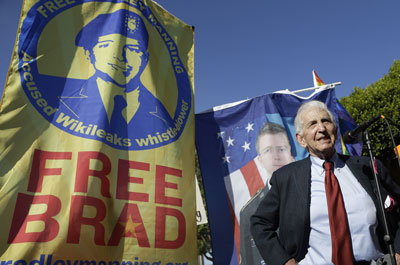
Daniel Ellsberg at rally April 29, 2013 protesting the revocation of Bradley Manning as SF Pride Grand Marshal. Photo: AP
But just days after the choice of Manning was announced, the Pride committee revoked the decision, issuing a baldly pro-military and anti-Bradley Manning statement that said in part: “[E]ven the hint of support for actions which placed in harm’s way the lives of our men and women in uniform—and countless others, military and civilian alike—will not be tolerated by the leadership of San Francisco Pride. It is, and would be, an insult to every one, gay and straight, who has ever served in the military of this country....”
An immediate outcry went up, with a large rally outside the Pride office mobilized overnight where former Pride Grand Marshals and representatives of other LGBT organizations, including the Harvey Milk Democratic Club, spoke out, joined by other antiwar voices from the Bradley Manning Support Network, Daniel Ellsberg, World Can’t Wait, Veterans for Peace and others. Chanting “THEY say Court Martial—WE say Grand Marshal!” the protesters denounced the Pride leadership and demanded Manning’s reinstatement. Denunciations of Pride’s decision as “cowardly,” “militaristic,” and “shameful” are blistering the pages of the LGBT media, and a full-page open letter signed by dozens of LGBT leaders has already been published in The SF Bay Reporter newspaper.
On May 7 the Pride Board of Directors held a public meeting, but in a conference room large enough for an audience of only 20, with cameras and the media barred and speakers from the public limited to 60 seconds each. With 100 protesters outside, chanting so loudly that Board members at times had to raise their voices to be heard, the Board announced its refusal to reinstate Manning—but this time, carefully avoiding any mention of war or court-martials or uniforms. Now they cited several new and ridiculous points of Pride committee bureaucracy, including Bradley Manning’s ineligibility to be Grand Marshal because “he isn’t local.” The ensuing “Shame, Shame, Shame” uproar forced the Board to adjourn early, and although they say this meeting will be rescheduled, no information about when or where has yet been announced.
The political firestorm that has broken open over Bradley Manning and the San Francisco Pride parade is of great import not only for the LGBT community but far beyond. As Revolution wrote in the article "The High Stakes Persecution of Bradley Manning": “Anyone who wants to see truth revealed, war crimes exposed and stopped, and justice done must demand that the persecution of Bradley Manning be ended, his charges dropped, and that he is freed.”
The Pride organization’s words and actions should send a chill down the backs of everyone. They accuse Manning of putting American troops in harm’s way and say “even a hint of support” for him can’t be “tolerated” in the LGBT community. What is happening when a whole section of the people—who have been the victims of systematic discrimination, persecution, and violent suppression—are ordered by these purported community leaders and spokespeople to support the U.S. war machine, and NOT support courageous resistance against it?
And what morality and outlook is being enforced when gay leaders try to bully the gay community into this pro-war complicity, denying honor to this courageous young gay soldier because “Bradley Manning hasn’t done anything for gay people”? (Unless these supposed leaders are impossibly ignorant, they are ignoring the well-known fact that long before his arrest, Bradley was an activist against Don’t Ask Don’t Tell, marched in Pride parades, and spoke out publicly as an active-duty soldier advocating for gay rights in the military.)
Joey Cain is a past president of Pride, and a former Grand Marshal. At the first protest Cain responded to this raggedy excuse: “I’ve got news for you! The gay community is part of the larger human community. What Bradley Manning did was something that was heroic... It helped the larger humanity, which we are part of! And if Pride is gonna say ‘You have to do this narrow thing that’s specifically gay-focused’ we’re gonna end up with NO ONE to be Grand Marshal, because once we all have our liberation as gay people, what about everybody else? Gay people are part of the larger world. Bradley made the larger world a better, better place!”
Bradley Manning’s court-martial is scheduled to begin June 3. A massive public rally supporting him will gather on June 1 at Ft Meade. San Francisco Pride follows on the weekend of June 30.
Permalink: http://revcom.us/a/303/visit-to-jeffersons-monticello-en.html
Revolution #303 May 12, 2013
A Visit to Jefferson's Monticello
Packaging Barbarism as Genius
May 9, 2013 | Revolution Newspaper | revcom.us
From two Revolution readers:
Thomas Jefferson's slave plantation, Monticello, sits atop of a small mountain in the rolling green countryside of Virginia. As many busloads of school kids know, it's a national monument. It's also a UNESCO World Heritage Site and one of the most important historical sites to the founding, legitimizing myths of this country. 500,000 people visit Monticello each year.
A couple of us learned this on a recent visit to Monticello while browsing the official brochure titled "Discover the GENIUS of Thomas Jefferson."
The centerpiece of any visit to Monticello is the House Tour of the mansion designed by Jefferson—considered by many as the most advanced example of architecture in the U.S. at that time. Our tour guide was a friendly copper-haired man sporting white linen trousers, a blue blazer, and a red tie emblazoned with signatures from the Declaration of Independence—the 1776 document penned by Jefferson which declared that all men are "created equal" and "endowed by their Creator with certain unalienable Rights, that among these are Life, Liberty and the pursuit of Happiness...."
The people not included as human beings in that document were also largely absent from the House Tour. When the guide started in on the history of the house, one of us interrupted, "Wasn't this place built by slaves?" This was cut off quickly with "Yes, it's an unfortunate fact that although Jefferson wrote about how he abhorred slavery, he owned 600 slaves in his lifetime and freed only nine. We don't really know why he did this, but the man was, believe it or not, constantly in debt." He added, a bit sadly, that DNA evidence now shows that Jefferson probably also fathered a number of children by his slave Sally Hemings. (This admission, it turned out, was forced on the Monticello Foundation, a result of public battles waged by descendants of Sally Hemings and others to win acknowledgement of paternity after 200 years.)

Depiction of plantation life, with overseer beating slaves and taking a child to be sold.
Before the moment could totally sour, the group was herded into Jefferson's "inner sanctum"—a lovely library (TJ owned more books than most institutions in the U.S. at the time), and a series of well-lighted rooms, a greenhouse and aviary, where Jefferson wrote letters, gardened, and tinkered, while gazing out over thousands of acres of beautifully-tended fields. Hereafter, our guide referred to the slaves as "servants" ("that's what Jefferson called them"), and attention was directed to Monticello's art works and architectural wonders like the innovative revolving door Jefferson had the slaves build, so as to keep most of them out of sight at his nightly dinner parties.
Our urge to visit Monticello was the product of engaging Bob Avakian's extensive work delving into Jefferson, democracy, and the foundations on which the United States was forged, in particular Communism and Jeffersonian Democracy. We were also prompted by reading Revolution's recent review of Henry Wiencek's book Master of the Mountain: Thomas Jefferson and His Slaves. The book has incited upset in some quarters for bringing into sharp focus Jefferson's ruthless expansion of slavery including across the entire continent with the Louisiana Purchase. And he's particularly despised by some Monticello historians for highlighting evidence that, far from being a "reluctant slave master," Jefferson was "a calculating, brutal owner of human beings who drove them relentlessly for his own profit, punished them without mercy, and saw the forced labor of black people as the surest path to his own enrichment." ("Thomas Jefferson: 'Flawed Giant' or Hardcore Defender of Slavery?," Revolution #288, December 16, 2012)
When we pulled Wiencek's book from our backpack, the House Tour guide, somewhat rattled, announced that the important thing to know about the author is that he simply "hated Jefferson." We challenged this epistemology and asked him to name one national policy decision Jefferson made as president which did not strengthen the slave system. His answer: "The 1807 law banning the importation of slaves into the U.S." We pointed out that this measure actually enhanced the market for slave owners living in the U.S.
Eventually we were politely told to take our "concerns" to the Slave Tour. So at 1 pm we joined a group of 25 or 30 outside the gift shop. The new tour guide, a young well-informed radical scholar, arrived and bluntly announced, "I have to warn you right now that what I will show you and tell you will not be pleasant. Slavery in the U.S. is one of the most horrific chapters in human history. You can leave now if you want to." No one did. What followed was an un-sugar-coated and highly detailed exposure of life on Jefferson's mountaintop as experienced for decades by hundreds of human beings, forced through physical and social coercion to erect Monticello, starting with removal by hand of the entire top of the mountain we were standing on—150 feet of stones, trees and dirt. This order-by-Pharaoh is brightly described in the brochure: "In 1768 Jefferson began leveling the Monticello mountaintop for a house"—as if TJ did the digging himself!
Notwithstanding the searing exposures by our guide on the Slave Tour (which we found out was called the "Plantation Community Tour" until nine months ago) and some revealing facts and figures on slave life on the Monticello website, the actual conditions for slaves has been rendered largely invisible for tourists on the grounds, or sanitized. No displays explaining how the slaves lived; the blacksmith, weaving, joinery and nail shops are not even reconstructed. You simply see outlines of foundations perched on a hill overlooking a bucolic landscape. The only viewable slave "home" is one nice-sized room next to the kitchen on the lower floor of the mansion where Jefferson's enslaved chef, Edith Fossett, and her blacksmith husband, Joe Fossett, lived.1 It is tastefully furnished, walls whitewashed, a great view... think Rough Guide bed-and-breakfast.
Also omitted was just how central slavery was to the founding of the United States of America. Recently one scholar noted, "It is not simply that the labor of enslaved people underwrote 19th-century capitalism. Enslaved people were the capital: four million people worth at least $3 billion in 1860, which was more than all the capital invested in railroads and factories in the United States combined." (Walter Johnson, "King Cotton's Long Shadow," New York Times Opinionator Blog, March 30, 2013,)
This, more than Jefferson's personal financial situation, explains why he not only didn't free his own slaves, but consistently fought to defend and expand the slave system, as Communism and Jeffersonian Democracy details. As Avakian succinctly puts it in the opening quote in BAsics, from the talks and writings of Bob Avakian: "There would be no United States as we now know it today without slavery. That is a simple and basic truth."
Wiencek makes an important observation in his book: "The very existence of slavery in the era of the American Revolution presents a paradox, and we have largely been content to leave it at that, since a paradox can offer a comforting state of moral suspended animation. Jefferson animates the paradox. And by looking closely at Monticello, we can see the process by which he rationalized an abomination to the point where an absolute moral reversal was reached and he made slavery fit into America's national enterprise." (emphasis ours)
Indeed, every single day thousands of (overwhelmingly white) tourists are instructed to marvel at how this whole operation was orchestrated by an innovative Enlightenment thinker to run like a well-oiled clock, everything in its place, a garden setting... the slaves "allowed" to live as families and even taught trades. The take-home message: Yes, Jefferson owned these people but, let's be adults here, look at the "context": he was smarter and kinder than most planters, and how bad could it have been for anyone to live up on that beautiful mountain. Plus, it was an unfortunate trade-off but consider what the slaves' labors freed up Jefferson to do—establish a state built on the great principles of freedom we Americans continue to enjoy.
As we were leaving, we ran into the head tour guide, who stood and listened to a round of criticism: How is it conscionable to move people from room to room describing furnishings and lavish parties, while virtually erasing the fact that hundreds of lives were ground up to make this possible—generations forced into back-breaking labor; whippings for insubordination (including 10-year-old boys); the ever-present threat of being sold down the river, ripped from family and all you know (which by the way happened to 135 members of this "plantation community" days after Jefferson's death). The guide replied, "Well that's discussed on the Slave Tour. People really don't want to hear about that on the House Tour."
The true "genius" of the modern-day Monticello experience: how this founding father's ruthlessly run slave plantation has been re-invented in a glorious house-hunter-style reality tour, with the peculiar barbarism of slavery soothingly rationalized, even "humanized"—all the way to the cookbooks in the gift shop featuring French sauces created by the slave-chef Edith in Jefferson's state-of-the-art kitchen.
But we also got a sense from the Slave Tour, the Hemings revelations, and the furor over the Wiencek book—that these issues—Jefferson, slavery, democracy... and what America was and is actually based on is a live wire fraught with contradiction, touching on core issues concerning the legitimacy of the current horrendous order.
Monticello is a key monument to Jefferson and the founding of the U.S., and as the good old narrative has been buffeted, the Monticello organization has had to incorporate some "painful truths" into the whole "flawed genius" narrative: (Slavery is a "flaw," but don't let that overshadow the genius of the founding fathers in creating the greatest political system in human history.)
There are cracks in that edifice, and we went home with a renewed appreciation of the tremendous—dynamic and here-and-now—importance of the work BA has done on the question of democracy and Jefferson—work which should be widely disseminated as part of the effort to get BA everywhere. Including at Monticello!




























